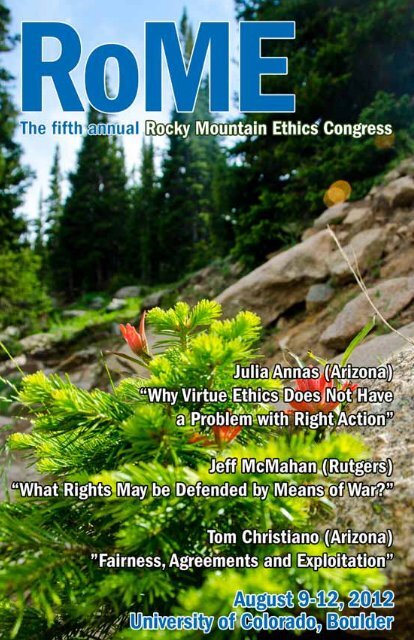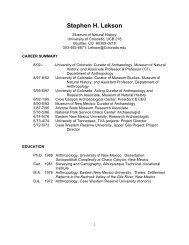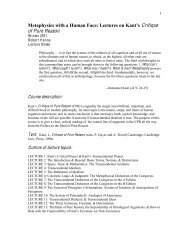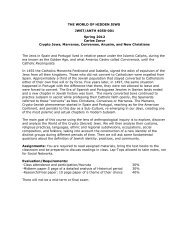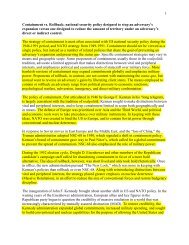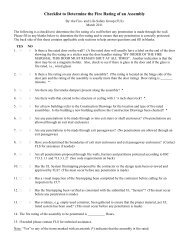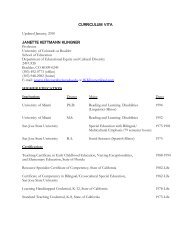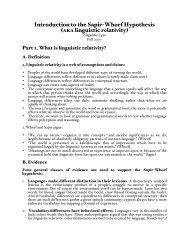Acknowledgementsl - University of Colorado Boulder
Acknowledgementsl - University of Colorado Boulder
Acknowledgementsl - University of Colorado Boulder
Create successful ePaper yourself
Turn your PDF publications into a flip-book with our unique Google optimized e-Paper software.
<strong>Acknowledgementsl</strong><br />
The RoME Congress is a collective effort. Special thanks go to the<br />
following parties:<br />
Core Organizers<br />
Alastair Norcross<br />
Benjamin Hale<br />
Assistant Organizers<br />
Duncan Purves<br />
Ryan Jenkins<br />
Paper Referees<br />
Corwin Aragon, Robert<br />
Hanna, David Boonin, Andrew<br />
Chapman, Eric Chwang, Carol<br />
Cleland, John Martin Fischer,<br />
Ben Hale, Chris Heathwood,<br />
Adam Hosein, Michael Huemer,<br />
Ryan Jenkins, John Fisher,<br />
Christian Lee, Tom Metcalf,<br />
Claudia Mills, Mitzi Lee, Wes<br />
Morriston, Alastair Norcross,<br />
Graham Oddie, Henry Pickford,<br />
Duncan Purves, Brian Talbot,<br />
Michael Tooley, Mark Van<br />
Roojen, Steven Vanderheiden,<br />
Ajume Wingo, Jason Wyck<strong>of</strong>f,<br />
Michael Zimmerman<br />
Young Ethicist Prize<br />
Committee<br />
Eric Chwang, Benjamin Hale,<br />
Alastair Norcross, Mark van<br />
Roojen<br />
Support<br />
Maureen Detmer, Philosophy<br />
Department<br />
Timothy Putnam, Philosophy<br />
Department<br />
Christina Patarino, CU<br />
Conference Planning Services<br />
CIRES (Cooperative<br />
Institute for Research in the<br />
Environmental Sciences)<br />
Elizabeth Hall, CIRES
RoME V<br />
The fifth annual Rocky<br />
Mountain Ethics Congress<br />
Keynote Speakers<br />
Julia Annas (Arizona)<br />
“Why virtue ethics does not have a problem with right action”<br />
Tom Christiano (Arizona)<br />
“Fairness, Agreements and Exploitation”<br />
Jeff McMahan (Rutgers)<br />
“What Rights May be Defended by Means <strong>of</strong> War?”<br />
Table <strong>of</strong> Contents<br />
Participants . . . . . . . . . . . . . . . . . . . . . . . . . . . . . . . . .4<br />
Abstracts . . . . . . . . . . . . . . . . . . . . . . . . . . . . . . . . . .14<br />
Schedule . . . . . . . . . . . . . . . . . . . . . . . . . . .Centerfold<br />
Notes . . . . . . . . . . . . . . . . . . . . . . . . . . . . . . . . . . . . .45<br />
Eateries and Info . . . . . . . . . . . . . . . . . . . . . . . . . . . .53<br />
Map <strong>of</strong> <strong>Boulder</strong> . . . . . . . . . . . . . . . . . . . . .Back Cover<br />
g<br />
K<br />
{<br />
e<br />
=<br />
,
Participants<br />
Keynote Speakers<br />
Julia Annas (Arizona)<br />
“Why virtue ethics does not have a problem with right action”<br />
Tom Christiano (Arizona)<br />
“Fairness, Agreements and Exploitation”<br />
g<br />
Jeff McMahan (Rutgers)<br />
“What Rights May be Defended by Means <strong>of</strong> War?”<br />
Author Meets Critics Session on<br />
Steven Sverdlik’s Motive and Rightness:<br />
Critics:<br />
Richard Galvin (Texas Christian <strong>University</strong>)<br />
Ken Rogerson (Florida International <strong>University</strong>)<br />
Author: Steven Sverdlik (Southern Methodist <strong>University</strong>)<br />
Panel Discussion on<br />
Derek Parfit’s On What Matters:<br />
Panelists:<br />
Stan Husi, (Wisconsin-Milwaukee)<br />
Sam Kerstein (Maryland-College Park)<br />
Bruce Russell (Wayne State)
<strong>University</strong> <strong>of</strong> <strong>Colorado</strong> <strong>Boulder</strong> 5<br />
Main Program<br />
1. Roman Altshuler (Stony Brook), “Character, Will, and Agency”<br />
— Commentator: Mavis Biss (Loyola)<br />
2. Marcus Arvan (U <strong>of</strong> Tampa), “Groundwork for a New Moral<br />
Epistemology: What Personality Research May Be Able to do for<br />
Moral and Political Philosophy”<br />
— Commentator: Trent Dougherty (Baylor)<br />
3. Sara Bernstein (Duke), “Omissions, morality, and possibility”<br />
— Commentator: Carolina Sartorio (Arizona)<br />
4. Gwen Bradford (Rice), “Problems for perfectionism”<br />
— Commentator: Stephanie Shiver (Utah)<br />
5. Tim Campbell (Rutgers), “Infinite utility and Cain’s paradox:<br />
How personal identity complicates the quantification problem”<br />
— Commentator: Melinda Roberts (College <strong>of</strong> New Jersey)<br />
6. Tom Carson (Loyola-Chicago), “President Lincoln: Slavery,<br />
Utilitarianism, and Moral Luck”<br />
— Commentator: Nolan Hatley (<strong>University</strong> <strong>of</strong> Tennessee-Knoxville)<br />
7. Randolph Clarke (Florida State), “Freely omitting to act”<br />
— Commentator: Darren Domsky (Texas A&M Galveston)<br />
8. Christian Coons (Bowling Green), “If the shoe fits, what kind <strong>of</strong><br />
reason do I have to wear it?”<br />
— Commentator: Alastair Norcross (<strong>University</strong> <strong>of</strong> <strong>Colorado</strong>)<br />
9. Eva Dadlez (Central Oklahoma), “Fetal sentience and legislation”<br />
— Commentator: Christopher Lean (Utah)
6 Rocky Mountain Ethics Congress V August 9-12, 2012<br />
10. Jorah Dannenberg (Stanford), “Promising, practices, and<br />
interpersonal obligation”<br />
— Commentator: Moti Gorin (Rice)<br />
11. Michael Deem (Notre Dame), “Dehorning the Darwinian<br />
dilemma for realist theories <strong>of</strong> value”<br />
— Commentator: Justin Horn (Wisconsin-Madison)<br />
12. Wiebke Deimling (Pennsylvania), “Kant’s Pragmatic Concept <strong>of</strong><br />
Emotions”<br />
— Commentator: Robert Shanklin (Santa Clara <strong>University</strong>)<br />
13. Dan Demetriou (Minnesota-Morris), “Realism and fundamental<br />
disagreement: The case <strong>of</strong> honor reconsidered”<br />
— Commentator: Peter Nichols (Wisconsin-Madison)<br />
14. Cristian Dimitriu (<strong>University</strong> <strong>of</strong> Kansas), “Odious debts and<br />
global justice”<br />
— Commentator: Gina Schouten (Wisconsin-Madison)<br />
15. Dale Dorsey (Kansas), “How not to argue against<br />
consequentialism”<br />
— Commentator: Justin Moss (Avila <strong>University</strong>)<br />
16. Michael Ducey (<strong>University</strong> <strong>of</strong> Cincinnati), “Ethical surrogacy in<br />
the face <strong>of</strong> noncompliance”<br />
— Commentator: Tony Smith (St. Cloud Technical College)<br />
17. Kyla Ebels-Duggan (Northwestern), “Dealing with the past:<br />
Responsibility and Personal History”<br />
— Commentator: Adam R. Thomson (<strong>University</strong> <strong>of</strong> Nebraska-<br />
Lincoln)
<strong>University</strong> <strong>of</strong> <strong>Colorado</strong> <strong>Boulder</strong> 7<br />
18. Mylan Engel (NIU), “Do Animals Have Rights, and Does it<br />
Matter if They Don’t?”<br />
— Commentator: Matthew Kopec (Wisconsin-Madison)<br />
19. Wenwen Fan (<strong>University</strong> <strong>of</strong> Missouri-Columbia), “Second-<br />
Personal Reasons and Moral Obligation”<br />
— Commentator: Robyn Gaier (Viterbo)<br />
20. David Faraci (Bowling Green State <strong>University</strong> / Virginia Tech),<br />
“Enemy <strong>of</strong> My Enemy: Nihilism and the Case for Cognitivism”<br />
— Commentator: Martin Turner (Wash U)<br />
21. Jeremy Garrett (Missouri-Kansas City), “Marriage, children, and<br />
the state”<br />
— Commentator: Colin Hickey (Georgetown)<br />
22. Carl Hammer (CUNY Baruch College), “Kant’s vegetarian<br />
imperative”<br />
— Commentator: Trevor Hedberg (<strong>University</strong> <strong>of</strong> Tennessee-<br />
Knoxville)<br />
23. Jason Hanna (NIU), “Doing, allowing, and the relevance <strong>of</strong> the<br />
past”<br />
— Commentator: Molly Gardner (Wisconsin-Madison)<br />
24. Edward Harcourt (Oxford), “The theory <strong>of</strong> approval and<br />
disapproval”<br />
— Commentator: Henry Pickford (<strong>University</strong> <strong>of</strong> <strong>Colorado</strong>)<br />
25. Paul Kelleher (Wisconsin-Madison), “Aggregation, relevance,<br />
and intransitivity”<br />
— Commentator: Justin Klocksiem (<strong>University</strong> <strong>of</strong> Alabama-<br />
Tuscaloosa)
8 Rocky Mountain Ethics Congress V August 9-12, 2012<br />
26. David Killoren (Coastal Carolina <strong>University</strong>), “Non-naturalist<br />
moral perception”<br />
— Commentator: Daniel Crow (Wisconsin-Madison)<br />
27. Charlie Kurth (Washington-St. Louis), “On moral motivation:<br />
Internalism, externalism, or spoils to the victor?”<br />
— Commentator: Caroline Arruda (UTEP)<br />
28. Jonathan Lang (Wisconsin-Madison), “Imperative logic and<br />
explicit performatives: The failure <strong>of</strong> the grammaticality principle<br />
and compositionality principle”<br />
— Commentator: Mark van Roojen (<strong>University</strong> <strong>of</strong> Nebraska<br />
Lincoln)<br />
29. Hallie Liberto (Connecticut), “Contextualizing Exploitation”<br />
— Commentator: John Harris (TCU)<br />
30. Matt Lutz (USC), “The ‘now what’ problem for error theory”<br />
— Commentator: Mike Huemer (<strong>University</strong> <strong>of</strong> <strong>Colorado</strong>)<br />
31. Adrienne Martin (Pennsylvania), “Gratitude, Disappointment,<br />
and Normative Hope”<br />
— Commentator: Emily McRae (<strong>University</strong> <strong>of</strong> Oklahoma)<br />
32. Patricia McShane (Georgetown), “A Kantian Defense <strong>of</strong> Selfdeception”<br />
— Commentator: Zac Cogley (Northern Michigan)<br />
33. Chris Melenovsky (U Penn), “The practice-dependent (yet<br />
personal) wrong <strong>of</strong> breaking promises”<br />
— Commentator: Nate Olson (Georgetown)
<strong>University</strong> <strong>of</strong> <strong>Colorado</strong> <strong>Boulder</strong> 9<br />
34. Garret Merriam (Southern Indiana), “Miscarriages <strong>of</strong> justice and<br />
the paradox <strong>of</strong> innocence: An experimental philosophy approach<br />
to the death penalty”<br />
— Commentator: Brian Talbot (<strong>University</strong> <strong>of</strong> <strong>Colorado</strong>)<br />
35. Zachary Miller (Rutgers), “Strong versus weak deontic necessity:<br />
A semantic argument with metaethical implications”<br />
— Commentator: Nate Sharadin (<strong>University</strong> <strong>of</strong> North Carolina-<br />
Chapel Hill)<br />
36. David Morrow (UAB), “Why act-consequentialism collapses into<br />
rule-consequentialism”<br />
— Commentator: Scott Forschler (St. Cloud Technical College)<br />
37. Collin O’Neil (Center for Bioethics, NYU), “Placebo controls<br />
and the doctrine <strong>of</strong> double effect”<br />
— Commentator: Anne Baril (<strong>University</strong> <strong>of</strong> New Mexico)<br />
38. Tyler Paytas (Washington-St. Louis), “Sympathetic Inclination<br />
and the Duty <strong>of</strong> Humanity: A Kantian Response to the Alienation<br />
Objection”<br />
— Commentator: Geraldine Ng (Reading)<br />
39. Theron Pummer (UCSD), “Would division multiply desert?”<br />
— Commentator: Jeff McMahan (Rutgers)<br />
40. Travis Rieder (Georgetown), “How to Reduce Morality to Self-<br />
Interest: A Reply to the Fool”<br />
— Commentator: Eric Chwang (<strong>University</strong> <strong>of</strong> <strong>Colorado</strong>)<br />
41. Mark Rosner (Queen’s <strong>University</strong>, Canada), “Defending the<br />
Rational Relations View”<br />
— Commentator: Danielle Wylie (Wisconsin-Madison)
10 Rocky Mountain Ethics Congress V August 9-12, 2012<br />
42. Brook Sadler (South Florida), “Marriage: A matter <strong>of</strong> right or<br />
virtue? Kant and the contemporary debate”<br />
— Commentator: Claudia Mills (<strong>University</strong> <strong>of</strong> <strong>Colorado</strong>)<br />
43. Jeff Sebo (New York <strong>University</strong>), “The narrative theory <strong>of</strong> the<br />
self ”<br />
— Commentator: Brian C<strong>of</strong>fey (UC Davis)<br />
44. Matthew Smith (Yale/Leeds), “Bootstrapping and the authority<br />
<strong>of</strong> intentions”<br />
— Commentator: Iskra Fileva (UNC Chapel Hill)<br />
45. Aaron Smuts (Rhode Island College), “A life worth living”<br />
— Commentator: Teresa Burke (Gallaudet <strong>University</strong>)<br />
46. Justin Snedegar (USC), “Contrastive reasons and promotion”<br />
— Commentator: Jason Raibley (Cal State – Long Beach)<br />
47. Vojko Strahovnik and Matjaz Potrc (<strong>University</strong> <strong>of</strong> Ljubljana),<br />
“Phenomenological objectivity”<br />
— Commentator: Kelly Heuer (Georgetown)<br />
48. Jennifer Szende (Queen’s <strong>University</strong>, Canada), “Global Justice<br />
and the Problem <strong>of</strong> Perspective”<br />
— Commentator: Danielle Wenner (Cleveland Clinic)<br />
49. Mikhail Valdman (Virginia Commonwealth), “Autonomy:<br />
Incoherent or unimportant?”<br />
— Commentator: Tait Szabo (<strong>University</strong> <strong>of</strong> Wisconsin-Washington<br />
County)<br />
50. Elijah Weber (Bowling Green), “What’s so great about moral<br />
responsibility?: A critique <strong>of</strong> narrative value”<br />
— Commentator: Zachary Goldberg (Arizona State <strong>University</strong>)
<strong>University</strong> <strong>of</strong> <strong>Colorado</strong> <strong>Boulder</strong> 11<br />
51. Justin Weinberg (South Carolina), “Why we are wrong about<br />
dependency”<br />
— Commentator: Ben Sachs (NYU)<br />
52. Rivka Weinberg (Scripps), “Procreation, paternalism, and<br />
consent”<br />
— Commentator: Doran Smolkin (Kwantlen Polytechnic)<br />
53. Erik Wielenberg (DePauw <strong>University</strong>), “Three ways the moral<br />
can supervene”<br />
— Commentator: Howard Nye (<strong>University</strong> <strong>of</strong> Alberta)<br />
54. Jack Woods and Derek Baker (Princeton), “Inconsistent<br />
attitudes and inconsistent contents: A defense <strong>of</strong> b-type<br />
inconsistency”<br />
— Commentator: Julia Staffel (<strong>University</strong> <strong>of</strong> Southern California)
Posters S<br />
Friday Presenters<br />
1. Caroline Arruda (UT-El Paso), “Can we choose not to be agents?<br />
Should we?”<br />
2. Jeff Behrends (Wisconsin-Madison), “Meta-normative Realism,<br />
Evolution, and Our Reasons to Survive”<br />
3. Zac Cogley (Northern Michigan), “How desert works”<br />
4. Darren Domsky (Texas A&M Galveston), “The duty <strong>of</strong> moral<br />
inertia”<br />
5. Molly Gardner (Wisconsin-Madison), “The comparative account <strong>of</strong><br />
loss”<br />
6. Nolan Hatley (Tennessee), “Nietzsche, Anscombe, and the<br />
foundations <strong>of</strong> deontology”<br />
7. Trevor Hedberg (Tennessee), “The asymmetry: No solution<br />
needed”<br />
8. Justin Horn (Wisconsin-Madison), “Fundamental moral<br />
disagreement, Sidgwick’s principle, and moral reliability”<br />
9. Justin Klocksiem (Alabama), “The open question argument, ethical<br />
non-naturalism, and a posteriori necessity”<br />
10. Christopher Lean (Utah), “Foot in mouth: The danger <strong>of</strong><br />
representing biological properties with normative language”<br />
11. Geraldine Ng (Reading), “Necessity, Impossibility, Incapacity”<br />
12. Howard Nye (<strong>University</strong> <strong>of</strong> Alberta), “Intellectual Abilities and<br />
Objective Goods”<br />
13. Stephanie Shiver (Utah), “Adding Cognitive Limitations to the<br />
Luck Egalitarian Account <strong>of</strong> Compensable Inequalities”<br />
14. Adam R. Thompson (Nebraska-Lincoln), “Optimism and<br />
resentment”<br />
15. Danielle Wylie (Wisconsin-Madison), “How psychopaths don’t<br />
threaten empirical rationalism: a response to Nichols”
<strong>University</strong> <strong>of</strong> <strong>Colorado</strong> <strong>Boulder</strong> 13<br />
Saturday Presenters<br />
1. Anne Baril (New Mexico), “The role <strong>of</strong> welfare in eudaimonism:<br />
Lessons learned from the egoism objection”<br />
2. Brian C<strong>of</strong>fey (UC Davis), “Why we do not need intrinsic goodness”<br />
3. Daniel Crow (Madison), “The rational explanation <strong>of</strong> our moral<br />
intuitions: towards a solution to the causal objection to nonnaturalism”<br />
4. Scott Forschler (St. Cloud Technical), “On “necessary” conditions<br />
for ends: Diagnosing a pervasive ethical fallacy”<br />
5. Zachary Goldberg (Arizona State), “The (In)Significance <strong>of</strong> Moral<br />
Belief”<br />
6. Fred Harrington (Edgewood College), “An interest theory <strong>of</strong><br />
rights”<br />
7. Kelly Heuer (Georgetown), “Normative silence”<br />
8. Colin Hickey (Georgetown), “Scaling up to global justice: A<br />
critique <strong>of</strong> statism”<br />
9. Russ Jacobs (Washburn), “Global warming is an ethical issue”<br />
10. Matthew Kopec (<strong>University</strong> <strong>of</strong> <strong>Colorado</strong>), “Race and forensic DNA<br />
phenotyping: untangling the ‘articulate collective’”<br />
11. Justin Moss (Washburn <strong>University</strong>), “Demandingness, fairness,<br />
and promoting the good: modifying the collective principle <strong>of</strong><br />
beneficence”<br />
12. Peter Nichols (Wisconsin-Madison), “Foundationalist reflective<br />
equilibrium”<br />
13. Nate Olson (Georgetown), “Why must I be my brother’s keeper?<br />
Recognition Respect and Relationships”<br />
14. Gina Schouten (Wisconsin-Madison), “Restricting Justice: Political<br />
Coercion in the Home and in the Market”<br />
15. Danielle Wenner (Cleveland Clinic), “Socially Valuable Knowledge<br />
and Justice in International Research”
Abstracts K<br />
Roman Altshuler (Stony Brook), “Character, Will, and Agency”<br />
Abstract: Character and the will are rarely discussed together. At most,<br />
philosophers working on the one mention the other in an eliminativist<br />
vein—if character is represented as something chosen, for example, it<br />
can be chalked up to the work <strong>of</strong> the will; if the will consists merely <strong>of</strong> a<br />
certain arrangement <strong>of</strong> mental states, it can be seen as little more than<br />
a manifestation <strong>of</strong> character. This mutual neglect appears perfectly<br />
justified. If both character and will are determinants <strong>of</strong> action, to treat<br />
them separately would be to overdetermine agency at best, and at worst<br />
to fragment it. While defending this reasoning, I argue that things are<br />
not so simple, because character and will serve distinct explanatory and<br />
normative functions, respectively. The difference in function, however,<br />
does not prove that character and will must be ontologically distinct<br />
sources <strong>of</strong> agency; only that our discourse about them must keep them<br />
apart.<br />
— Commentator: Mavis Biss (Loyola)<br />
Marcus Arvan (U <strong>of</strong> Tampa), “Groundwork for a New Moral Epistemology:<br />
What Personality Research May Be Able to do for Moral and Political<br />
Philosophy”<br />
Abstract: This paper argues that empirical research on personality<br />
traits and behavioral dispositions suggests a new kind <strong>of</strong> moral virtue<br />
epistemology in moral and political philosophy – an epistemology<br />
which would have us epistemically evaluate normative moral and<br />
political judgments on the basis <strong>of</strong> those judgments’ observed<br />
relationships to morally admirable and morally repugnant personality<br />
traits and behavior. The basic idea is that if particular moral or political<br />
judgments are found to be related to morally bad personality traits and<br />
behavior, then we should reject those judgments in favor <strong>of</strong> moral and<br />
political judgments found to correlate with morally good personality<br />
traits and behavior. I utilize some recent research on three dark and<br />
antisocial personality traits (the “Dark Triad” <strong>of</strong> Machiavellianism,<br />
Narcissism, and Psychopathy), as well as proposed research on overt
<strong>University</strong> <strong>of</strong> <strong>Colorado</strong> <strong>Boulder</strong> 15<br />
misconduct, to lay some groundwork for future research based on this<br />
new epistemological proposal.<br />
— Commentator: Trent Dougherty (Baylor)<br />
Sara Bernstein (Duke), “Omissions, morality, and possibility”<br />
Abstract: What is an omission? Suppose that an airplane technician eats<br />
lunch rather than perform a safety check, and the airplane crashes due<br />
to a malfunction. Intuitively, the technician’s failure to check the plane<br />
causes the plane to crash. Exactly what is the failure to check the plane?<br />
Omissions are metaphysically puzzling. On the one hand, they seem to<br />
be nothing: they are events that do not occur. On the other hand, we<br />
intuitively reify omissions, grant them causal efficacy, and give them a<br />
role in moral judgments.<br />
I present and defend the view that omissions are unactualized<br />
possibilities, and then show how the view accounts for several pieces<br />
<strong>of</strong> moral data. I also show how the view provides a new inroad into<br />
understanding Peter Singer’s argument for giving to charity.<br />
— Commentator: Carolina Sartorio (Arizona)<br />
Gwen Bradford (Rice), “Problems for perfectionism”<br />
Abstract: I defend perfectionism – the view that developing the human<br />
essence is good – against some recent formulations <strong>of</strong> classic objections.<br />
The first objection is that that perfectionism counterintuitively<br />
undervalues the relevance <strong>of</strong> (1) pleasure and (2) preferences. The<br />
second objection is a sophisticated version <strong>of</strong> the “wrong properties”<br />
objection, wherein the intuitively plausibility <strong>of</strong> the perfectionist ideal<br />
is threatened by a lack <strong>of</strong> theoretical pressure to accept putative wrong<br />
properties cases. I argue this objection is unsuccessful because it fails<br />
to distinguish between general claims and substantive views. However,<br />
when pushed further, the objection leads to a serious worry, what I call<br />
the Deep Problem: Perfectionism fails to <strong>of</strong>fer a satisfying foundational<br />
justification for why developing the human essence is valuable. The<br />
lack <strong>of</strong> immediate intuitions directed toward the general perfectionist<br />
claim place a special burden on perfectionism to provide a justificatory<br />
foundation, in contrast to other competing axiologies.<br />
— Commentator: Stephanie Shiver (Utah)
16 Rocky Mountain Ethics Congress V August 9-12, 2012<br />
Tim Campbell (Rutgers), “Infinite utility and Cain’s paradox: How personal<br />
identity complicates the quantification problem”<br />
Abstract: James Cain has presented an intriguing paradox involving<br />
infinite utility. He has shown that if two distributions, A and B, each<br />
contain an infinite amount <strong>of</strong> utility, as well as the same persons<br />
and times, then A may contain more utility than B at each time even<br />
if A is worse than B (with respect to utility) for each person. Peter<br />
Vallentyne has claimed that the spirit <strong>of</strong> traditional utilitarianism<br />
favors B over A and has proposed a person-centered Pareto principle<br />
for ranking infinite distributions that entails that entails this result. I<br />
argue that given plausible assumptions about a person’s identity over<br />
time, Cain’s paradox can arise in special cases that involve merely finite<br />
quantities <strong>of</strong> utility, and that some <strong>of</strong> these cases constitute powerful<br />
counterexamples to Vallentyne’s Pareto principle and its alleged<br />
compatibility with traditional utilitarian ideals.<br />
— Commentator: Melinda Roberts (College <strong>of</strong> New Jersey)<br />
Tom Carson (Loyola-Chicago), “President Lincoln: Slavery, Utilitarianism,<br />
and Moral Luck”<br />
Abstract: In 1861 Lincoln overruled Fremont’s order for partial<br />
emancipation in Missouri. The Emancipation Proclamation didn’t<br />
free slaves in the border states or Tennessee. Lincoln did not support<br />
the complete abolition <strong>of</strong> slavery until 1864. Although these policies<br />
were prima facie very wrong, they were morally justified because they<br />
were necessary to win the Civil War. Lincoln was a utilitarian and<br />
his policies in question can be justified on both utilitarian and nonutilitarian<br />
grounds. Lincoln and the Union had just cause for fighting<br />
the Civil War, even at the beginning <strong>of</strong> the war when emancipation<br />
was not a war aim. Lincoln enjoyed good moral luck in that his policies<br />
turned out well. However, he was justified in thinking that they would<br />
turn out for the best, even though almost no one (including Lincoln)<br />
accurately predicted the outcome <strong>of</strong> the war.<br />
— Commentator: Nolan Hatley (<strong>University</strong> <strong>of</strong> Tennessee-Knoxville)<br />
Randolph Clarke (Florida State), “Freely omitting to act”<br />
Abstract: We take it for granted that commonly we act freely and we’re<br />
generally morally responsible for what we do when we so act. Can<br />
there be such a thing as freely omitting to act, or freely refraining or
<strong>University</strong> <strong>of</strong> <strong>Colorado</strong> <strong>Boulder</strong> 17<br />
forbearing, and can we be similarly responsible for omitting, refraining,<br />
and forbearing? I’ll advance affirmative answers and suggest how we<br />
might understand our freedom and responsibility in such cases.<br />
— Commentator: Darren Domsky (Texas A&M Galveston)<br />
Christian Coons (Bowling Green), “If the shoe fits, what kind <strong>of</strong> reason do I<br />
have to wear it?”<br />
Abstract: I first argue that an attitude can be fitting and yet there is<br />
no reason to have it --call this thesis No Reasons (“NR”). I then ask<br />
whether NR is boon or threat to Fitting-Attitudes (“FA”) accounts<br />
<strong>of</strong> value. The good news: FA now avoids its famous Wrong Kind <strong>of</strong><br />
Reasons problem. The bad news: FA now faces difficulty in accounting<br />
for value’s practical relevance.<br />
After reflecting value’s conceptual role, I suggest an FA account would<br />
most faithfully secure value’s practical relevance—but not one entailing<br />
reasons to feel as fit—but reasons to do what the fully-informed and<br />
rational would do in virtue <strong>of</strong> feeling as it fit. On this picture, fittingattitudes<br />
are the conative attitudes <strong>of</strong> ideal practical deliberation—<br />
attitudes that fix what we ought or have reason to do. Valuable objects<br />
then, are the objects <strong>of</strong> these ideal conative attitudes. Along the way, I<br />
explain why defensible deontic theories require such conative ideals.<br />
— Commentator: Alastair Norcross (<strong>University</strong> <strong>of</strong> <strong>Colorado</strong>)<br />
Eva Dadlez (Central Oklahoma), “Fetal sentience and legislation”<br />
Abstract: Over the past two years, several states have proposed, and<br />
almost as many have passed, something referred to as the Pain-Capable<br />
Unborn Child Protection Act, a piece <strong>of</strong> legislation that makes abortion<br />
impermissible once fetal pain is possible and that further stipulates<br />
the fetus can feel pain at or before 20 weeks <strong>of</strong> gestation. We will<br />
investigate whether the claim <strong>of</strong> fetal pain perception at or before 20<br />
weeks is true, and how such a claim is to be substantiated. Next, we<br />
will inquire whether the fetal capacity to experience pain, at whatever<br />
stage <strong>of</strong> development, reflects on the morality <strong>of</strong> abortion, and whether<br />
it should be at all relevant to determining its legality. Finally, we would<br />
like to explore the implications that a commitment to a pain-related or<br />
sentience criterion <strong>of</strong> rights might have for a pro-life agenda.<br />
— Commentator: Christopher Lean (Utah)
18 Rocky Mountain Ethics Congress V August 9-12, 2012<br />
Jorah Dannenberg (Stanford), “Promising, practices, and interpersonal<br />
obligation”<br />
Abstract: Social practice-based accounts <strong>of</strong> promising explain the<br />
obligation <strong>of</strong> a promise by appeal to facts about the entire community<br />
in which it is made. Scanlon and others have suggested that such<br />
accounts cannot explain the distinctively interpersonal character<br />
<strong>of</strong> the way a promise binds. I argue that this objection is rooted in<br />
a conception <strong>of</strong> the rules <strong>of</strong> our practice <strong>of</strong> promising that is unduly<br />
impoverished: it assumes our practice’s rules must be specifiable in<br />
entirely non-moral terms. But a richer conception that makes use <strong>of</strong><br />
moral terms in understanding the rules by which practitioners relate to<br />
one another was central to the social-practice view from its inception<br />
– it is suggested by Hume’s account <strong>of</strong> fidelity as an artificial virtue.<br />
I argue that this richer conception better characterizes our actual<br />
practice <strong>of</strong> promising, and shows how that practice leads to distinctively<br />
interpersonal obligations between promisors and their promisees.<br />
— Commentator: Moti Gorin (Rice)<br />
Michael Deem (Notre Dame), “Dehorning the Darwinian dilemma for<br />
realist theories <strong>of</strong> value”<br />
Abstract: My aim in this paper is to critically examine Sharon Street’s<br />
‘Darwinian dilemma’ for normative realism (DD). I challenge Street’s<br />
claim that the normative realist cannot adequately accommodate the<br />
hypothesis that evolutionary forces have had a tremendous effect on our<br />
evaluative experience. I begin by pointing out a number <strong>of</strong> scientifically<br />
implausible commitments DD requires and proposing plausible<br />
alternatives that avoid the problems that beset Street’s own adaptive<br />
link account. I then turn to the task <strong>of</strong> constructing an outline for an<br />
evolutionary behavioral theory that the realist can utilize to explain<br />
the connection between evolutionary forces and the independent<br />
normative facts he or she posits. The upshot is that it should become<br />
clear that DD does not pose a threat to normative realism and that<br />
evolutionary-behavioral theory underdetermines the choice between<br />
realism and antirealism in metaethics.<br />
— Commentator: Justin Horn (Wisconsin-Madison)
<strong>University</strong> <strong>of</strong> <strong>Colorado</strong> <strong>Boulder</strong> 19<br />
Wiebke Deimling (Pennsylvania), “Kant’s Pragmatic Concept <strong>of</strong> Emotions”<br />
Abstract: This paper argues that, although Kant does not have a term<br />
corresponding to our contemporary concept <strong>of</strong> emotions, he does<br />
provide a concept that is similar in scope. I call this concept Kant’s<br />
pragmatic concept <strong>of</strong> emotions because it is implicit in his project <strong>of</strong> an<br />
“anthropology from a pragmatic point <strong>of</strong> view”. This concept picks out<br />
all states that are <strong>of</strong> special interest to his anthropological project and<br />
cuts across different concepts <strong>of</strong> particular types <strong>of</strong> affective states that<br />
he distinguishes. Kant gives an empirical account <strong>of</strong> these states. But<br />
empirical psychology in his anthropology is always subservient to his<br />
account <strong>of</strong> the right attitude we should take towards our affective states<br />
and the role they should play in moral motivation. The paper shows that<br />
Kant takes a treatment <strong>of</strong> what we would now call our emotional life to<br />
be important for his theory <strong>of</strong> virtue and moral life.<br />
— Commentator: Robert Shanklin (Santa Clara <strong>University</strong>)<br />
Dan Demetriou (Minnesota-Morris), “Realism and fundamental<br />
disagreement: The case <strong>of</strong> honor reconsidered”<br />
Abstract: John Doris and Alexandra Plakias (2008) use the Nisbett-<br />
Cohen (1996) account <strong>of</strong> honor to suggest that honor-based norms<br />
fundamentally disagree with Western liberal ones. The divide between<br />
Western liberals and Southern honor-adherents is an important piece<br />
<strong>of</strong> evidence in their empirical case for moral antirealism. In this essay,<br />
I point out some empirical inadequacies with the Nisbett-Cohen<br />
account. These are noteworthy points in themselves, considering<br />
the Nisbett-Cohen account’s influence on empirically-informed<br />
philosophers. Furthermore, I suggest another account <strong>of</strong> honor that<br />
actually strengthens Doris and Plakias’ case for fundamental moral<br />
disagreement. Nonetheless, I argue that the persistent appeal <strong>of</strong> the<br />
honor ethos isn’t best explained by antirealism, but pluralism—a<br />
“diffusing explanation” on behalf <strong>of</strong> realism that itself has considerable<br />
empirical support.<br />
— Commentator: Peter Nichols (Wisconsin-Madison)<br />
Cristian Dimitriu (<strong>University</strong> <strong>of</strong> Kansas), “Odious debts and global justice”<br />
Abstract: I explain the conditions that need to exist in order for a debt<br />
to be binding. I do this by clarifying the notion <strong>of</strong> “Odious Debts”. The<br />
moral question that lies at the heart <strong>of</strong> the concept <strong>of</strong> odious debts is the
20 Rocky Mountain Ethics Congress V August 9-12, 2012<br />
following: If a despotic or corrupt leader uses loan money to repress his<br />
people, maintain himself in power, buy personal luxuries or any other<br />
illegitimate act; then why should citizens and their future generations<br />
bear the burden to repay what are basically the personal debts <strong>of</strong> their<br />
former captor? In order to answer this question, I connect the problem<br />
<strong>of</strong> odious debts with theories <strong>of</strong> social contract, and argue that the<br />
reason why certain debts are not binding in the first place is that they do<br />
not satisfy the conditions that generated collective responsibility (that<br />
is, that made citizens be bound by the state). Among these conditions,<br />
an important one is that rulers cannot be said to be acting in the<br />
name <strong>of</strong> the people when they fail act in accordance with any minimal<br />
acceptable threshold <strong>of</strong> political action.<br />
— Commentator: Gina Schouten (Wisconsin-Madison)<br />
Dale Dorsey (Kansas), “How not to argue against consequentialism”<br />
Abstract: In this paper, I argue that one class <strong>of</strong> objection to<br />
consequentialism is illegitimate. This class starts by noting that<br />
consequentialism requires agents to perform actions that, plausibly,<br />
agents lack decisive practical reasons to perform. But given that moral<br />
requirements are rationally decisive (i.e., one always has decisive<br />
practical reason to conform to moral requirements), consequentialism<br />
cannot adequately characterize the moral point <strong>of</strong> view. The demands<br />
<strong>of</strong> consequentialism fail to maintain the connection to practical<br />
rationality enjoyed by moral demands. Call this critique---which itself<br />
takes many forms---the ``objection from moral rationalism”. One<br />
obvious way to oppose this critique is to argue that moral rationalism<br />
is false. This is not my strategy; I will not object to the objection from<br />
moral rationalism on the grounds that its central premise is misguided.<br />
Rather, I leave open the possibility that a persuasive argument for the<br />
rational decisiveness <strong>of</strong> moral demands can and will be found. My<br />
claim is different. I claim that objections from moral rationalism<br />
are either internally inconsistent or they rely on a prior rejection <strong>of</strong><br />
consequentialism (and are hence either moot or beg the question).<br />
Either way, objections from moral rationalism---which include the<br />
classic demandingness and integrity objections---should simply be<br />
discarded.<br />
— Commentator: Justin Moss (Avila <strong>University</strong>)
<strong>University</strong> <strong>of</strong> <strong>Colorado</strong> <strong>Boulder</strong> 21<br />
Michael Ducey (<strong>University</strong> <strong>of</strong> Cincinnati), “Ethical surrogacy in the face <strong>of</strong><br />
noncompliance”<br />
Abstract: This paper addresses the issue <strong>of</strong> a Kantian agent maintaining<br />
ethical integrity given the presence <strong>of</strong> agents that aren’t following<br />
the rules. Sometimes, when others don’t behave in a moral way,<br />
those remaining consistent to their ethical principles suffer. Tamar<br />
Schapiro has argued that actions normally considered wrong under a<br />
Kantian framework can be “surrogated” for moral choices in order to<br />
thwart the harm from noncomplying agents. I argue that Schapiro’s<br />
surrogacy requires the existence <strong>of</strong> an independent standard by which<br />
the surrogated action can be seen as the morally preferable option<br />
to the Kantian. The required existence <strong>of</strong> the independent standard<br />
undermines the idea <strong>of</strong> Kantianism as an objective moral theory.<br />
Objective theories cannot remain objective while acknowledging the<br />
correctness <strong>of</strong> another standard when it comes to handling difficult<br />
moral predicaments. Thus, Schapiro’s method <strong>of</strong> surrogacy cannot<br />
work if we want Kantianism to exist in its current form.<br />
— Commentator: Tony Smith (St. Cloud Technical College)<br />
Kyla Ebels-Duggan (Northwestern), “Dealing with the past: Responsibility<br />
and Personal History”<br />
Abstract: We are dependent on others for our moral formation, and need<br />
others’ help if we are to develop well. Many people think that, if we lack<br />
this help during our formative years, we cannot be held responsible or<br />
blamed for things that we do in adulthood. I reject this position, and<br />
argue that unfortunate formative circumstances do not undermine the<br />
warrant for either responsibility or blame. I then diagnose the tendency<br />
to think that formative circumstances do matter in this way, arguing<br />
that knowledge <strong>of</strong> these circumstances can play an essential epistemic<br />
role in our interpersonal interactions.<br />
— Commentator: Adam R. Thomson (<strong>University</strong> <strong>of</strong> Nebraska-Lincoln)<br />
Mylan Engel (NIU), “Do Animals Have Rights, and Does it Matter if They<br />
Don’t?”<br />
Abstract: I develop and defend a conditional pro<strong>of</strong> that animals have<br />
negative moral rights including the right to life, the right to bodily<br />
integrity, the right not to be tortured, and the right not to be harmed.<br />
I argue that most people are rationally committed to the view that
22 Rocky Mountain Ethics Congress V August 9-12, 2012<br />
animals have such negative rights, on pain <strong>of</strong> inconsistency. I then<br />
consider what duties we have to animals, if the condition on which<br />
I predicate my conditional pro<strong>of</strong> <strong>of</strong> animal rights fails to obtain. I<br />
conclude that even if animals don’t have rights, we still have stringent<br />
duties not to harm or kill them.<br />
— Commentator: Matthew Kopec (Wisconsin-Madison)<br />
Wenwen Fan (<strong>University</strong> <strong>of</strong> Missouri-Columbia), “Second-Personal Reasons<br />
and Moral Obligation”<br />
Abstract: Stephan Darwall (2006, 2010) claims that a conceptual<br />
connection exists between moral obligation and what he calls<br />
‘second-personal reasons.’ In particular, he (2006) claims that, “moral<br />
obligation is an irreducibly second-personal concept. That an action<br />
would violate a moral obligation is…a second-personal reason not to do<br />
it.” A second-personal reason, according to him (2006), is “a distinctive<br />
kind <strong>of</strong> (normative) reason for acting,” a reason made on one’s will and<br />
purportedly given by an authority’s demand or address.<br />
This paper argues that Darwall fails to establish the above conceptual<br />
connection between second-personal reasons and moral obligation. The<br />
implication is that Darwall has to modify his account, accepting either<br />
the idea that his account is incompatible with the concept <strong>of</strong> impersonal<br />
moral obligation or the idea that second-personal reasons at best<br />
account for only interpersonal morality.<br />
— Commentator: Robyn Gaier (Viterbo)<br />
David Faraci (Bowling Green State <strong>University</strong> / Virginia Tech), “Enemy <strong>of</strong><br />
My Enemy: Nihilism and the Case for Cognitivism”<br />
Abstract: If all goes well when we deliberate, our actions are informed<br />
by our normative attitudes, which are themselves informed by the<br />
normative truth. Yet according to expressivism, ultimately there is<br />
nothing to normativity beyond such attitudes. Thus, in an important<br />
sense, expressivism seems anti-objectivist. In this paper, I suggest<br />
that expressivism’s “negation problem” can be employed to make this<br />
intuitive, objectivity-based case against expressivism more powerful.<br />
Specifically, I argue that expressivists are likely unable to both solve the<br />
negation problem and make sense <strong>of</strong> a kind <strong>of</strong> commonplace nihilistic<br />
doubt that is a symptom <strong>of</strong> the objectivist nature <strong>of</strong> normative thought<br />
and language. I first argue, following Mark Schroeder’s discussion <strong>of</strong>
<strong>University</strong> <strong>of</strong> <strong>Colorado</strong> <strong>Boulder</strong> 23<br />
the negation problem, that there is no plausible expressivist-friendly<br />
semantic interpretation <strong>of</strong> nihilistically motivated negated normative<br />
claims (e.g., “murdering is not wrong”). And, I maintain, the nature<br />
<strong>of</strong> normative thought and language ensures that an interpretation is<br />
required.<br />
— Commentator: Martin Turner (Wash U)<br />
Jeremy Garrett (Missouri-Kansas City), “Marriage, children, and the state”<br />
Abstract: Increasingly, those seeking exclusive state support for<br />
“traditional marriage” have made the children’s well-being defense<br />
(CWD) their centerpiece argument. At first glance, this argument<br />
looks remarkably straightforward and intuitively compelling –<br />
the state should only recognize and support as “marriages” those<br />
relationships composed <strong>of</strong> one man and one woman because children<br />
fare best within a traditional family structure. However, appearances<br />
are deceiving. Once all the implicit premises in this argument are<br />
unpacked and critically examined, CWD turns out to be neither<br />
straightforward nor particularly compelling. In this presentation, I<br />
<strong>of</strong>fer a multi-faceted critique <strong>of</strong> CWD that challenges three important<br />
dimensions <strong>of</strong> the argument: (1) conceptual coherence, (2) empirical<br />
credibility, and (3) normative adequacy. Moreover, I argue that<br />
effectively promoting children’s well-being requires a more direct and<br />
less marriage-centric approach from the state. I conclude by describing<br />
some basic principles that should guide this approach.<br />
— Commentator: Colin Hickey (Georgetown)<br />
Carl Hammer (CUNY Baruch College), “Kant’s vegetarian imperative”<br />
Abstract: Kant’s ethics is used by some as a defense <strong>of</strong> the exploitation<br />
<strong>of</strong> animals and is criticized by others for not sufficiently acknowledging<br />
the moral relevance <strong>of</strong> the plight <strong>of</strong> animals. These appeals overlook<br />
the broad applicability <strong>of</strong> Kant’s principles. In this paper, I argue that<br />
Kant’s ethics implies a duty to abstain from almost all meat and some<br />
other animal products derived from farming. I argue that there is a<br />
Kantian principle not to choose goods that have been derived from vice,<br />
with certain qualifications. Since animal farming as we know it in our<br />
society almost universally involves vice according to Kant’s ethics, we<br />
have a Kantian duty to abstain from its products.<br />
— Commentator: Trevor Hedberg (<strong>University</strong> <strong>of</strong> Tennessee-Knoxville)
24 Rocky Mountain Ethics Congress V August 9-12, 2012<br />
Jason Hanna (NIU), “Doing, allowing, and the relevance <strong>of</strong> the past”<br />
Abstract: Most deontologists claim that it is more objectionable to do<br />
harm than it is to allow harm <strong>of</strong> comparable magnitude. I argue that<br />
this view faces a largely neglected puzzle regarding the moral relevance<br />
<strong>of</strong> an agent’s past behavior. Consider an agent who chooses to save<br />
five people rather than one, where the one person’s life is in jeopardy<br />
because <strong>of</strong> something the agent did earlier. How are the agent’s<br />
obligations affected by the fact that his now letting the one die would<br />
retroactively make it the case that he has killed? I argue that the most<br />
promising deontological response to this question is difficult to defend.<br />
Further, even if it could be defended, it would not resolve a further set<br />
<strong>of</strong> cases, in which commonsense intuition indicates that an agent is<br />
required to terminate a threat she initiated more recently in preference<br />
to a threat she initiated less recently.<br />
— Commentator: Molly Gardner (Wisconsin-Madison)<br />
Edward Harcourt (Oxford), “The theory <strong>of</strong> approval and disapproval”<br />
Abstract: In a well-known series <strong>of</strong> papers, David Velleman has<br />
attempted to effect a ‘marriage <strong>of</strong> Freud and Kant’ – that is, to<br />
make room for our close personal ties in a realistic account <strong>of</strong> the<br />
development <strong>of</strong> rational agency. Like Freud’s, Velleman’s account relies<br />
on the idea <strong>of</strong> internalized others, but this feature <strong>of</strong> it lays the account<br />
open to an objection: if internalized others really are others, then their<br />
presence is incompatible with the phenomenon they are introduced<br />
to explain, namely the developed subject’s autonomy. Focusing on the<br />
role <strong>of</strong> parental approval and disapproval in the development <strong>of</strong> selfregulation,<br />
the present paper attempts to make use <strong>of</strong> some ideas from<br />
attachment theory in such a way as to circumvent this objection.<br />
— Commentator: Henry Pickford (<strong>University</strong> <strong>of</strong> <strong>Colorado</strong>)<br />
Paul Kelleher (Wisconsin-Madison), “Aggregation, relevance, and<br />
intransitivity”<br />
Abstract: Consequentialists embrace thoroughgoing aggregation;<br />
most non-consequentialists do not. I defend a non-consequentialist<br />
alternative to thoroughgoing aggregation that employs Kamm’s<br />
and Scanlon’s notion <strong>of</strong> an irrelevant good. I first aim to rebut an<br />
objection to the idea <strong>of</strong> relevance that Alastair Norcross has pressed<br />
in the literature. I then address two further objections that I find more
<strong>University</strong> <strong>of</strong> <strong>Colorado</strong> <strong>Boulder</strong> 25<br />
threatening (one by Broome, one by Norcross). These objections<br />
purport to identify real-world examples in which ostensibly irrelevant<br />
goods are aggregated to outweigh much larger goods in ways that<br />
trouble few non-consequentialists. In response, I suggest that these may<br />
not be genuine examples <strong>of</strong> aggregation at all, but rather cases in which<br />
the promotion <strong>of</strong> very minor goods is permissible because society is<br />
already sufficiently committed to promoting larger and more important<br />
goods.<br />
— Commentator: Justin Klocksiem (<strong>University</strong> <strong>of</strong> Alabama-Tuscaloosa)<br />
David Killoren (Coastal Carolina <strong>University</strong>), “Non-naturalist moral<br />
perception”<br />
Abstract: According to the causal constraint on perception, in order<br />
for S to perceive that P, there must be causal contact between S and P.<br />
According to standard moral non-naturalism, moral facts are causally<br />
inert. So, it seems, moral non-naturalism is incompatible with the<br />
hypothesis that moral facts are perceivable. Some have attempted<br />
to defend non-naturalist moral perception by attacking the causal<br />
constraint, and by arguing that the causal constraint should be replaced<br />
by the reliability constraint, which requires only that perception be<br />
generated by a reliable mechanism. I argue that a reliability-based<br />
defense <strong>of</strong> the possibility <strong>of</strong> non-naturalist moral perception fails,<br />
but that an alternative defense can succeed. In §1 and §2, I attack the<br />
reliability constraint. Then, in §3, I attack the causal constraint. Finally,<br />
in §4, I argue for a different constraint on perception: the explanatory<br />
relatedness constraint. This constraint makes room for non-naturalist<br />
moral perception.<br />
— Commentator: Daniel Crow (Wisconsin-Madison)<br />
Charlie Kurth (Washington-St. Louis), “On moral motivation: Internalism,<br />
externalism, or spoils to the victor?”<br />
Abstract: Our understanding <strong>of</strong> moral judgment and its relation to<br />
motivation builds from deep, but competing, internalist and externalist<br />
intuitions. Despite the entrenched nature <strong>of</strong> these rival intuitions,<br />
most participants in debates about moral motivation believe that a<br />
more careful examination <strong>of</strong> them will reveal whether internalism<br />
or externalism is more plausible. That is a mistake. I show that this<br />
standard approach stalls because it focuses on too narrow a set <strong>of</strong><br />
intuitions. I then argue that progress is possible if we look more
26 Rocky Mountain Ethics Congress V August 9-12, 2012<br />
systematically at the role that moral judgment plays in a broad range <strong>of</strong><br />
metaethical phenomena. Not only does this alternative approach help<br />
advance debates about moral motivation, but it also has implications for<br />
metaethics more generally.<br />
— Commentator: Caroline Arruda (UTEP)<br />
Jonathan Lang (Wisconsin-Madison), “Imperative logic and explicit<br />
performatives: The failure <strong>of</strong> the grammaticality principle and<br />
compositionality principle”<br />
Abstract: An orthodox principle <strong>of</strong> compositionality for imperatives is<br />
as follows: If some sentential component x <strong>of</strong> a sentence S (constructed<br />
from the standard logical connectives) is an imperative (i.e., expresses<br />
a prescription), then S is also an imperative. A widely endorsed<br />
grammatical constraint on the construction <strong>of</strong> complex imperative<br />
sentences is as follows: Imperative sentences cannot grammatically be<br />
embedded in conditional subordinator ‘if ’ or ‘only if ’ clauses. In this<br />
paper, I show that the compositionality principle and the grammatical<br />
constraint are both false. More specifically, I show that explicit<br />
performative imperatives are capable <strong>of</strong> flouting the compositionality<br />
principle precisely because such sentences are the only imperatives<br />
that can disobey the above grammatical constraint. I end by briefly<br />
discussing some semantic considerations concerning explicit<br />
performative imperatives.<br />
— Commentator: Mark van Roojen (<strong>University</strong> <strong>of</strong> Nebraska Lincoln)<br />
Hallie Liberto (Connecticut), “Contextualizing Exploitation”<br />
Abstract: Mikhail Valdman has recently argued that wrongful<br />
exploitation is the extraction <strong>of</strong> excessive benefits from someone who<br />
cannot reasonably refuse one’s <strong>of</strong>fer. I start this paper by describing<br />
Valdman’s argument from the best explanation for his account <strong>of</strong><br />
exploitation, an argument that reveals problems with a variety <strong>of</strong><br />
popular alternative accounts, including those <strong>of</strong> Allen Wood, Ruth<br />
Sample, and Alan Wertheimer. I then defend Alan Wertheimer against<br />
Valdman by suggesting that wrongful exploitation can occur even in<br />
some circumstances in which the person we exploit is in a position<br />
whereby he can reasonably refuse our <strong>of</strong>fer. Next, I describe a certain<br />
type <strong>of</strong> context within which extracting excessive benefits from<br />
someone who cannot refuse our <strong>of</strong>fer is not wrong. Finally, I suggest<br />
that this last critique also poses problems for competing accounts <strong>of</strong>
<strong>University</strong> <strong>of</strong> <strong>Colorado</strong> <strong>Boulder</strong> 27<br />
wrongful exploitation, including Wood’s and Wertheimer’s, revealing a<br />
need for a new or modified theory <strong>of</strong> exploitation.<br />
— Commentator: John Harris (TCU)<br />
Matt Lutz (USC), “The ‘now what’ problem for error theory”<br />
Abstract: Error theorists hold that, although our first-order moral<br />
thought and discourse commits us to the existence <strong>of</strong> moral truths,<br />
there are no such truths. Holding this position in metaethics puts<br />
the error theorist in an uncomfortable position regarding first-order<br />
morality. When it comes to our pre-theoretic moral commitments, what<br />
should the error theorist think? What should she say? What should she<br />
do? I call this the ‘Now What’ Problem for Error Theory.<br />
This paper suggests a framework for evaluating different approaches<br />
to the ‘Now What’ Problem, and goes on to evaluate the three most<br />
common responses to this problem. All three are found to have<br />
noteworthy problems. Finally, I present my own solution, and argue<br />
that it presents the most appealing solution to the ‘Now What’ Problem.<br />
— Commentator: Mike Huemer (<strong>University</strong> <strong>of</strong> <strong>Colorado</strong>)<br />
Adrienne Martin (Pennsylvania), “Gratitude, Disappointment, and<br />
Normative Hope”<br />
Abstract: I want to examine the way we sometimes place hope in people,<br />
and argue that it is a distinctive and fundamental way <strong>of</strong> relating to<br />
people interpersonally. I aim to fill two gaps in the philosophical<br />
literature. First, recent philosophical literature on hope—which<br />
is fairly small, to begin with—focuses on our hopes for particular<br />
outcomes to unfold in the world rather than hopes that are essentially<br />
interpersonal. What I will call normative hope has not been previously<br />
identified. Second, the existing literature on interpersonal relations<br />
focuses on holding people responsible and, I will argue, normatively<br />
hoping for a person to live up to some principle <strong>of</strong> behavior is a way <strong>of</strong><br />
aspiring on her behalf, which is closely related to but different from<br />
holding her responsible for her behavior.<br />
— Commentator: Emily McRae (<strong>University</strong> <strong>of</strong> Oklahoma)<br />
Patricia McShane (Georgetown), “A Kantian Defense <strong>of</strong> Self-deception”<br />
Abstract: In this paper I explore the moral dimensions <strong>of</strong> self-deception<br />
from a Kantian perspective. On the assumption that there is such a
RoME V Schedule Thursday, 8/9<br />
28<br />
Time Muenzinger E417 Hale 230 HUM 250 HUM 150<br />
Randolph Clarke<br />
"Freely omitting to act"<br />
Tim Campbell<br />
"Infinite utility and Cain's<br />
paradox: How personal<br />
identity complicates the<br />
Jonathan Lang<br />
"Imperative logic and explicit<br />
performatives: The failure <strong>of</strong> the<br />
grammaticality principle and<br />
compositionality principle"<br />
Paper<br />
quantification problem"<br />
Melinda Roberts Darren Domsky<br />
Bradley Monton Jonathan Spelman<br />
(None)<br />
1 T: T: 12-1:15<br />
Mark van Roojen<br />
Dan Kaufman<br />
Comments<br />
Chair<br />
Jack Woods and<br />
Derek Baker<br />
Matt Lutz<br />
Jorah Dannenberg<br />
Jason Hanna<br />
"Inconsistent attitudes and<br />
Paper<br />
"The 'now what' problem for "Promising, practices, and "Doing, allowing, and the<br />
inconsistent contents: A<br />
error theory"<br />
interpersonal obligation" relevance <strong>of</strong> the past"<br />
defense <strong>of</strong> b-type<br />
inconsistency"<br />
Comments Julia Staffel Mike Huemer Moti Gorin Molly Gardner<br />
Chair Brian Talbot Melinda Roberts Jonathan Spelman Nick Byrd<br />
David Faraci<br />
Dan Demetriou<br />
Marcus Arvan<br />
Mark Rosner<br />
"Groundwork for a New Moral<br />
"Enemy <strong>of</strong> My Enemy: "Realism and fundamental<br />
Paper "Defending the Rational<br />
Epistemology: What Personality<br />
Nihilism and the Case for disagreement: The case <strong>of</strong><br />
Relations View"<br />
Research May Be Able to do for<br />
Cognitivism"<br />
honor reconsidered"<br />
Moral and Political Philosophy"<br />
Comments Danielle Wylie Martin Turner Peter Nichols Trent Dougherty<br />
Chair Randy Clarke Paul Bowman Michael Growden Nick Byrd<br />
Hale 270<br />
2 T: 1:30-2:45 1:30-2:45 1:30-2:45<br />
3 T: 3-4:15<br />
Keynote: Jeff McMahan (Rutgers)<br />
“What Rights May be Defended Defended by Means <strong>of</strong> War?”<br />
Hale Hale 270<br />
270<br />
4 T: 4:30-6<br />
Reception<br />
CU CU Koenig Koenig Alumni Alumni Center<br />
Center<br />
T: 6:30-8
RoME V Schedule Friday, 8/10<br />
29<br />
Time HUM 1B90 HUM 250 HUM 125 HUM 135<br />
Kyla Ebels-Duggan<br />
"Dealing with the past:<br />
Responsibility and Personal<br />
History"<br />
Chris Melenovsky<br />
"The practice-dependent (yet<br />
personal) wrong <strong>of</strong> breaking<br />
promises"<br />
Gwen Bradford<br />
"Problems for perfectionism"<br />
Paper<br />
5 F: 8:45-10<br />
Stephanie Shiver Adam R. Thomson<br />
Special Session on Derek<br />
Par�t’s Par�t’s Par�t’s Par�t’s Par�t’s Par�t’s On What Ma�ers Ma�ers Ma�ers Ma�ers Ma�ers Ma�ers<br />
Claudia Mills Randy Clarke<br />
Stephanie Shiver<br />
Van Tu<br />
Comments<br />
Chair<br />
Jennifer Szende<br />
"Global Justice and the<br />
Problem <strong>of</strong> Perspective"<br />
�eron Pummer<br />
"Would division multiply<br />
desert?"<br />
Panelists:<br />
Panelists: Panelists:<br />
Stan Stan Husi<br />
Husi<br />
Sam Sam Kerstein<br />
Kerstein<br />
Bruce Bruce Russell<br />
Russell<br />
Tom Carson<br />
"President Lincoln: Slavery,<br />
Utilitarianism, and Moral<br />
Luck"<br />
Paper<br />
6 F: 10:10-11:25<br />
Jeff McMahan Danielle Wenner<br />
Nolan Hatley<br />
Claudia Mills Van Tu<br />
Julie van Camp<br />
Comments<br />
Chair<br />
Ma�hew Smith<br />
"Bootstrapping and the<br />
authority <strong>of</strong> intentions"<br />
Sara Bernstein<br />
"Omissions, morality, and<br />
possibility"<br />
Christian Coons<br />
"If the shoe fits, what kind <strong>of</strong><br />
reason do I have to wear it?"<br />
Carl Hammer<br />
"Kant's vegetarian imperative"<br />
Paper<br />
7 F: 11:35-12:50<br />
Comments Trevor Hedberg Alastair Norcross Carolina Sartorio Iskra Fileva<br />
Chair David Morrow Edward Harcourt Adam Hosein Bradley Monton<br />
F: 1 – 2:15 Friday Poster Session
RoME V Schedule Friday, 8/10 Continued<br />
30<br />
Friday Poster Presenta.ons<br />
1. Caroline Arruda (UT-El Paso), "Can we choose not to be agents? Should we?"<br />
2. Jeff Behrends (Wisconsin-Madison), "Meta-normative Realism, Evolution, and Our Reasons to Survive"<br />
3. Zac Cogley (Northern Michigan), "How desert works"<br />
4. Darren Domsky (Texas A&M Galveston), "�e duty <strong>of</strong> moral inertia"<br />
5. Molly Gardner (Wisconsin-Madison), "�e comparative account <strong>of</strong> loss"<br />
6. Nolan Hatley (Tennessee), "Nietzsche, Anscombe, and the foundations <strong>of</strong> deontology"<br />
7. Trevor Hedberg (Tennessee), "�e asymmetry: No solution needed"<br />
8. Justin Horn (Wisconsin-Madison), "Fundamental moral disagreement, Sidgwick's principle, and moral reliability"<br />
9. Justin Klocksiem (Alabama), "�e open question argument, ethical non-naturalism, and a posteriori necessity"<br />
10. Christopher Lean (Utah), "Foot in mouth: �e danger <strong>of</strong> representing biological properties with normative language"<br />
11. Geraldine Ng (Reading), "Necessity, Impossibility, Incapacity"<br />
12. Howard Nye (<strong>University</strong> <strong>of</strong> Alberta), "Intellectual Abilities and Objective Goods"<br />
13. Stephanie Shiver (Utah), "Adding Cognitive Limitations to the Luck Egalitarian Account <strong>of</strong> Compensable Inequalities"<br />
14. Adam R. Thompson (Nebraska-Lincoln), "Optimism and resentment"<br />
15. Danielle Wylie (Wisconsin-Madison), "How psychopaths don't threaten empirical rationalism: a response to Nichols"
RoME V Schedule Friday, 8/10 Continued<br />
31<br />
Time HUM 1B90 HUM 1B80 HUM 125 HUM 135<br />
Edward Harcourt<br />
"�e theory <strong>of</strong> approval and<br />
disapproval"<br />
Paul Kelleher<br />
"Aggregation, relevance, and<br />
intransitivity"<br />
Michael Deem<br />
"Dehorning the Darwinian<br />
dilemma for realist theories <strong>of</strong><br />
value"<br />
Zachary Miller<br />
"Strong versus weak deontic<br />
necessity: A semantic<br />
argument with metaethical<br />
implications"<br />
Paper<br />
8 F: 2:30-3:45<br />
Comments Nate Sharadin Justin Horn Justin Klocksiem Henry Pickford<br />
Chair Ryan Jenkins Michael Growden Melinda Roberts Vojko Strahovnik<br />
Roman Altshuler<br />
"Character, Will, and Agency"<br />
Rivka Weinberg<br />
"Procreation, paternalism, and<br />
consent"<br />
Charlie Kurth<br />
"On moral motivation:<br />
Internalism, externalism, or<br />
spoils to the victor?"<br />
Brook Sadler<br />
"Marriage: A ma�er <strong>of</strong> right or<br />
virtue? Kant and the<br />
contemporary debate"<br />
Paper<br />
9 F: 4-5:15<br />
Comments Claudia Mills Caroline Arruda Doran Smolkin Mavis Biss<br />
Chair Lisa �omas-Smith Paul Bowman Julie van Camp Randy Clarke<br />
Keynote: Julia Annas (Arizona)<br />
“Why “Why “Why “Why “Why virtue ethics does not have a problem with right action”<br />
Hale 270<br />
10 F: 5:30-7<br />
Reception<br />
Dushanbe Tea House, 1770 13th Reception<br />
Dushanbe Tea House, 1770 13 Street th Reception<br />
Dushanbe Tea House, 1770 13 Street th Reception<br />
Dushanbe Tea House, 1770 13 Street th Reception<br />
Dushanbe Tea House, 1770 13 Street th Street<br />
F: 7:10 – 8:10
RoME V Schedule Saturday, 8/11<br />
32<br />
Time HUM 135 HUM 1B80 HUM 250 HUM 1B90<br />
Author Meets Critic<br />
Session on Steven Sverdlik’s<br />
Motive and Rightness<br />
Dale Dorsey<br />
"How not to argue against<br />
consequentialism"<br />
Elijah Weber<br />
"What's so great about moral<br />
responsibility?: A critique <strong>of</strong><br />
narrative value"<br />
David Killoren<br />
"Non-naturalist moral<br />
perception"<br />
Paper<br />
11 SA: 8:45-10<br />
Author:<br />
Steven Sverdlik<br />
Critics:<br />
Critics:<br />
Richard Richard Galvin<br />
Galvin<br />
Ken Ken Rogerson<br />
Rogerson<br />
Comments Daniel Crow Zachary Goldberg Justin Moss<br />
Chair Quincy Faircloth Edward Harcourt Paul Bowman<br />
Travis Rieder<br />
Eva Dadlez<br />
Cristian Dimitriu<br />
"How to Reduce Morality to<br />
Paper<br />
“Fetal sentience and "Odious debts and global<br />
Self-Interest: A Reply to the<br />
legislation”<br />
justice"<br />
Fool"<br />
Comments Eric Chwang Christopher Lean Gina Schouten<br />
Chair Vojko Strahovnik Nick Byrd Michael Growden<br />
12 SA: 10:10-11:25<br />
10:10-11:25<br />
Saturday Poster Session/Lunch<br />
SA: 11:30-1<br />
Vojko Strahovnik and<br />
Matjaz Potrc<br />
"Phenomenological<br />
objectivity"<br />
Michael Ducey<br />
"Ethical surrogacy in the face<br />
<strong>of</strong> noncompliance"<br />
Wenwen Fan<br />
"Second-Personal Reasons<br />
and Moral Obligation"<br />
Wiebke Deimling<br />
"Kant's Pragmatic Concept <strong>of</strong><br />
Emotions"<br />
Paper<br />
13 SA: 1:00-2:15<br />
Comments Robert Shanklin Robyn Gaier Tony Smith Kelly Heuer<br />
Chair Julia Staffel Lisa Thomas-Smith Ben Hale Bradley Monton<br />
R&R: Coordinated hikes, walks, trips<br />
Evening/A�ernoon Evening/A�ernoon Evening/A�ernoon Evening/A�ernoon Evening/A�ernoon Free<br />
Free<br />
SA: 2:30-???
RoME V Schedule Saturday, 8/11 Continued<br />
33<br />
Saturday Poster Presenta.ons<br />
1. Anne Baril (New Mexico), "The role <strong>of</strong> welfare in eudaimonism: Lessons learned from the egoism objection"<br />
2. Brian C<strong>of</strong>fey (UC Davis), "Why we do not need intrinsic goodness"<br />
3. Daniel Crow (Madison), "The rational explanation <strong>of</strong> our moral intuitions: towards a solution to the causal objection to non-naturalism"<br />
4. Scott Forschler (St. Cloud Technical), "On "necessary" conditions for ends: Diagnosing a pervasive ethical fallacy"<br />
5. Zachary Goldberg (Arizona State), "The (In)Significance <strong>of</strong> Moral Belief "<br />
6. Fred Harrington (Edgewood College), “An interest theory <strong>of</strong> rights”<br />
7. Kelly Heuer (Georgetown), "Normative silence"<br />
8. Colin Hickey (Georgetown), "Scaling up to global justice: A critique <strong>of</strong> statism"<br />
9. Russ Jacobs (Washburn), "Global warming is an ethical issue"<br />
10. Matthew Kopec (<strong>University</strong> <strong>of</strong> <strong>Colorado</strong>), "Race and forensic DNA phenotyping: untangling the 'articulate collective'"<br />
11. Justin Moss (Washburn <strong>University</strong>), "Demandingness, fairness, and promoting the good: modifying the collective principle <strong>of</strong> beneficence"<br />
12. Peter Nichols (Wisconsin-Madison), "Foundationalist reflective equilibrium"<br />
13. Nate Olson (Georgetown), "Why must I be my brother's keeper? Recognition Respect and Relationships"<br />
14. Gina Schouten (Wisconsin-Madison), "Restricting Justice: Political Coercion in the Home and in the Market"<br />
15. Danielle Wenner (Cleveland Clinic), "Socially Valuable Knowledge and Justice in International Research"
RoME V Schedule Sunday, 8/12<br />
34<br />
Time HUM 135 HUM 125 HUM 1B80 HUM 1B90<br />
Garret Merriam<br />
"Miscarriages <strong>of</strong> justice and the<br />
paradox <strong>of</strong> innocence: An<br />
experimental philosophy<br />
approach to the death penalty"<br />
Tyler Paytas<br />
"Sympathetic Inclination and<br />
the Duty <strong>of</strong> Humanity: A<br />
Kantian Response to the<br />
Alienation Objection"<br />
Hallie Liberto<br />
"Contextualizing Exploitation"<br />
Paper<br />
(None)<br />
14 SU: SU: SU: 8:45-10<br />
Geraldine Ng Brian Talbot<br />
Ryan Jenkins Nick Byrd<br />
John Harris<br />
Quincy Faircloth<br />
Comments<br />
Chair<br />
Jeremy Garrett<br />
"Marriage, children, and the<br />
state"<br />
Aaron Smuts<br />
"A life worth living"<br />
Justin Snedegar<br />
"Contrastive reasons and<br />
promotion"<br />
Collin O'Neil<br />
"Placebo controls and the<br />
doctrine <strong>of</strong> double effect"<br />
Paper<br />
15 SU: 10:10-11:25<br />
Comments Anne Baril Jason Raibley Teresa Burke Colin Hickey<br />
Chair Michael Growden Julia Staffel Duncan Purves Nick Byrd<br />
Adrienne Martin<br />
Mikhail Valdman<br />
Patricia McShane<br />
Justin Weinberg<br />
Paper "Gratitude, Disappointment, "Autonomy: Incoherent or "A Kantian Defense <strong>of</strong> Self- "Why we are wrong about<br />
and Normative Hope"<br />
unimportant?"<br />
deception"<br />
dependency"<br />
16 SU: SU: 11:35-12:50<br />
Comments Emily McRae Tait Szabo Zac Cogley Ben Sachs<br />
Chair Chelsea Haramia Teresa Burke Duncan Purves Adam Hosein<br />
Jeff Sebo<br />
"The narrative theory <strong>of</strong> the<br />
self "<br />
David Morrow<br />
"Why act-consequentialism<br />
collapses into ruleconsequentialism"<br />
Erik Wielenberg<br />
"Three ways the moral can<br />
supervene"<br />
Mylan Engel<br />
"Do Animals Have Rights, and<br />
Does it Matter if They Don't?"<br />
Paper<br />
17 SU: SU: 2:30-3:45<br />
Comments Matthew Kopec Howard Nye Scott Forschler Brian C<strong>of</strong>fey<br />
Chair Chelsea Haramia Dan Kaufman Ryan Jenkins Ben Hale<br />
Keynote: Thomas Christiano (Arizona)<br />
“Fairness, Agreements and Exploitation”<br />
Hale 270<br />
18 SU: 4-6
<strong>University</strong> <strong>of</strong> <strong>Colorado</strong> <strong>Boulder</strong> 35<br />
thing as self-deception I argue that, sometimes, self-deception helps<br />
us to promote our own ends without corroding social trust and the<br />
foundations <strong>of</strong> human community. My view is Kantian in spirit,<br />
although not in letter; what I argue is clearly contrary to what Kant<br />
writes, however, I believe we can make sense <strong>of</strong> the permissibility <strong>of</strong><br />
self-deception within a Kantian framework.<br />
— Commentator: Zac Cogley (Northern Michigan)<br />
Chris Melenovsky (U Penn), “The practice-dependent (yet personal) wrong<br />
<strong>of</strong> breaking promises”<br />
Abstract: In Rawls’s analysis, the wrong <strong>of</strong> breaking a promise is<br />
practice-dependent; it is wrong to break a promise because the<br />
principle <strong>of</strong> fairness obligates us to follow the rules <strong>of</strong> a social practice<br />
<strong>of</strong> promise-keeping. T.M. Scanlon and others have criticized this<br />
explanation because it seems to present a broken promise as a wrong<br />
done to practice-participants generally rather than as a personal wrong<br />
done to the promisee specifically. In this paper, I defend the Rawlsian<br />
view against this objection by appeal to the legitimate expectations<br />
that arise from justified social practices. When a practice is sufficiently<br />
justified, participants not only have an obligation to follow the rules<br />
but legitimate expectations that others will follow those rules as well.<br />
As such, we can explain the personal wrong <strong>of</strong> breaking a promise as<br />
disrespecting the legitimate expectations <strong>of</strong> the promisee.<br />
— Commentator: Nate Olson (Georgetown)<br />
Garret Merriam (Southern Indiana), “Miscarriages <strong>of</strong> justice and the<br />
paradox <strong>of</strong> innocence: An experimental philosophy approach to the death<br />
penalty”<br />
Abstract: As long as we have a death penalty we will inevitably execute<br />
innocent people. It has been argued by many, such as Radelet, Bedau<br />
and Putnam, that such miscarriages <strong>of</strong> justice mean we should abolish<br />
the death penalty. I argue that, paradoxically, if we abolish the death<br />
penalty more innocent people will be punished for crimes they did<br />
not commit. Miscarriages <strong>of</strong> justice will increase because the ‘surplus<br />
oversight’ (extra appeals, more lawyer hours, etc.) that attend capital<br />
cases will disappear. I constructed and implemented an experiment to<br />
test this hypothesis and the results support my conclusion: if we abolish<br />
the death penalty we will pay less attention to wrongful convictions<br />
and hence inadvertently more people will spend the rest <strong>of</strong> their lives
36 Rocky Mountain Ethics Congress V August 9-12, 2012<br />
in prison for crimes they did not commit. Ironically, if we want to avoid<br />
miscarriages <strong>of</strong> justice, we have a reason to keep the death penalty.<br />
— Commentator: Brian Talbot (<strong>University</strong> <strong>of</strong> <strong>Colorado</strong>)<br />
Zachary Miller (Rutgers), “Strong versus weak deontic necessity: A semantic<br />
argument with metaethical implications”<br />
Abstract: We can distinguish between two kinds <strong>of</strong> deontic necessity:<br />
strong deontic necessity, associated with have to and must, and weak<br />
deontic necessity, associated with ought to and should. I argue that<br />
our judgments concerning strong deontic necessity are corrupted<br />
by morally irrelevant factors. Judgments concerning weak deontic<br />
necessity, on the other hand, are not similarly affected. Strong deontic<br />
necessity should be avoided, as should related moral notions, such as<br />
the notions <strong>of</strong> duty and obligation. Weak deontic necessity should be<br />
used instead.<br />
— Commentator: Nate Sharadin (<strong>University</strong> <strong>of</strong> North Carolina-Chapel Hill)<br />
David Morrow (UAB), “Why act-consequentialism collapses into ruleconsequentialism”<br />
Abstract: It is sometimes thought that rule-consequentialism (RC)<br />
collapses into act-consequentialism (AC). In fact, the opposite is true:<br />
AC collapses into RC, making AC untenable. This paper presents a very<br />
abstract schema for consequentialist theories and explains AC and RC<br />
as specifications <strong>of</strong> that schema. It then presents two types <strong>of</strong> cases,<br />
described in game theoretic terms, in which AC fails to assign truthvalues<br />
to many first-order normative claims unless it is supplemented<br />
in a way that transforms it into RC. That is, these are cases in which AC<br />
simply gives no answer, even in principle, to questions about what to do,<br />
but RC does give an answer. Therefore, would-be act-consequentialists<br />
must accept a “truth-gappy” form <strong>of</strong> AC, abandon consequentialism<br />
altogether, or adopt some form <strong>of</strong> RC. The paper briefly compares the<br />
kind(s) <strong>of</strong> RC that result from this argument with “traditional” RC.<br />
— Commentator: Scott Forschler (St. Cloud Technical College)<br />
Collin O’Neil (Center for Bioethics, NYU), “Placebo controls and the<br />
doctrine <strong>of</strong> double effect”<br />
Abstract: There is presently a consensus that clinical researchers are<br />
justified in doing less than their best for the subjects in their trials
<strong>University</strong> <strong>of</strong> <strong>Colorado</strong> <strong>Boulder</strong> 37<br />
when necessary to obtain results that will help future patients more. I<br />
criticize this view on the grounds that it neglects the constraint against<br />
allowing harm as a means, and describe several trial designs that intend<br />
the harmful consequences <strong>of</strong> withholding care as a means to various<br />
research-related ends. Consent is capable <strong>of</strong> canceling this kind <strong>of</strong><br />
wrong, but the question <strong>of</strong> what conditions consent must meet to do<br />
so can only be answered by consulting the justification underlying<br />
the Doctrine <strong>of</strong> Double Effect. I <strong>of</strong>fer an interpretation <strong>of</strong> one <strong>of</strong> the<br />
traditional rationales that implies that successful consent must not only<br />
be informed and voluntary, but also “cooperative,” a condition that is<br />
<strong>of</strong>ten unmet, but would be feasible to meet.<br />
— Commentator: Anne Baril (<strong>University</strong> <strong>of</strong> New Mexico)<br />
Tyler Paytas (Washington-St. Louis), “Sympathetic Inclination and the Duty<br />
<strong>of</strong> Humanity: A Kantian Response to the Alienation Objection”<br />
Abstract: Kant held that an agent’s conduct has moral worth only if it<br />
is done from duty, not merely in accordance with it. Critics find this<br />
emphasis on acting from duty objectionably alienating. I defend Kant<br />
by showing that his system allows that it is sometimes better to act from<br />
sympathetic inclination rather than duty. Kant recognizes that due to<br />
contingent facts about human nature, conduct motivated by duty alone<br />
is unlikely to accomplish certain moral ends. Human beings, by nature,<br />
need to know that other people feel genuine sympathetic concern for<br />
them. Thus, fulfillment <strong>of</strong> our duty to promote the happiness <strong>of</strong> others<br />
requires that we sometimes help from sympathy rather than duty.<br />
Kant refers to the cultivation and utilization <strong>of</strong> sympathy as the duty <strong>of</strong><br />
humanity. While actions performed from sympathetic inclination lack<br />
genuine moral worth, the ideal Kantian agent performs such actions<br />
with regularity.<br />
— Commentator: Geraldine Ng (Reading)<br />
Theron Pummer (UCSD), “Would division multiply desert?”<br />
Abstract: It seems plausible that (i) how much punishment a person<br />
deserves cannot be affected by the mere existence or nonexistence<br />
<strong>of</strong> another person. We might have also thought that (ii) how much<br />
punishment is deserved cannot increase merely in virtue <strong>of</strong> personal<br />
division. I argue that (i) and (ii) are inconsistent with the popular belief<br />
that, other things being equal, when people culpably do very wrong<br />
acts, they ought to be punished for this, even if punishing them would
38 Rocky Mountain Ethics Congress V August 9-12, 2012<br />
benefit no one. Ins<strong>of</strong>ar as we cannot plausibly deny (i), we are forced to<br />
either abandon the popular belief in desert, or else allow that personal<br />
division could, as I put it, “multiply desert.” Division cases might, I<br />
suggest, lead us to rethink desert.<br />
— Commentator: Jeff McMahan (Rutgers)<br />
Travis Rieder (Georgetown), “How to Reduce Morality to Self-Interest: A<br />
Reply to the Fool”<br />
Abstract: Those who intend to reduce morality to self-interest must<br />
respond to Hobbes’ Fool: if morality is really to be generated from<br />
particular agents’ interests, then how do we deal with those cases<br />
in which it seems clearly in one’s interest to act in paradigmatically<br />
immoral ways? A promising response is to argue indirectly, holding that<br />
it is in one’s interest to adopt, as a strategy, the rules <strong>of</strong> common sense<br />
morality.<br />
In this paper, I accept this indirect argument for reductionism, with the<br />
goal <strong>of</strong> seeing whether, given the move from acts to strategies, we can in<br />
fact derive the desired judgments about particular, token acts. While<br />
it may seem obvious that if one ought to be honest, then one ought not<br />
to lie in some particular case; however, Derek Parfit makes a powerful<br />
argument that this is not the case. I will here argue that the reductionist<br />
can, in fact, accept the desired judgments about particular acts, since we<br />
ought to act on the strategies we ought to adopt.<br />
— Commentator: Eric Chwang (<strong>University</strong> <strong>of</strong> <strong>Colorado</strong>)<br />
Mark Rosner (Queen’s <strong>University</strong>, Canada), “Defending the Rational<br />
Relations View”<br />
Abstract: The rational relations view <strong>of</strong> moral responsibility holds that it<br />
is not the connection with choice that is the mark <strong>of</strong> responsible agency;<br />
rather it is the connection <strong>of</strong> an attitude or action with an agent’s<br />
evaluative capacities that determines when an agent is responsible. In<br />
this paper I defend the rational relations view <strong>of</strong> moral responsibility<br />
against three criticisms – first, that it cannot make good sense <strong>of</strong> our<br />
responsibility for practical irrationalities such as akrasia; second, that it<br />
cannot account for responsibility in cases where our general capacities<br />
are defeated in the particular circumstances; and finally that it cannot<br />
account for our responsibility for what we notice and neglect, forget and<br />
omit. I distinguish a wide and narrow version <strong>of</strong> the rational relations
<strong>University</strong> <strong>of</strong> <strong>Colorado</strong> <strong>Boulder</strong> 39<br />
view and in each case claim that the criticisms are convincing only on<br />
the narrow, but not on the wide, reading.<br />
— Commentator: Danielle Wylie (Wisconsin-Madison)<br />
Brook Sadler (South Florida), “Marriage: A matter <strong>of</strong> right or virtue? Kant<br />
and the contemporary debate”<br />
Abstract: Is marriage fundamentally a public matter, subject to state<br />
sanction, or a private matter? Adopting Kant’s distinction between a<br />
doctrine <strong>of</strong> right, which addresses the external conduct <strong>of</strong> agents within<br />
the framework <strong>of</strong> civil society, and a doctrine <strong>of</strong> virtue, which addresses<br />
duties that cannot be publicly enforced, I argue that marriage properly<br />
falls under the doctrine <strong>of</strong> virtue. Thus, it is private in a very particular,<br />
ethically significant sense. I argue that Kant erred in placing marriage<br />
within the doctrine <strong>of</strong> right because <strong>of</strong> his limited view <strong>of</strong> sexuality.<br />
Once we correct for this view <strong>of</strong> sexuality, and marriage is re-positioned<br />
within the doctrine <strong>of</strong> virtue, we have the theoretical resources to see<br />
marriage as an ethically ideal relationship. This view is consistent with<br />
both Kant’s larger ethical theory and contemporary marriage norms.<br />
The view <strong>of</strong> marriage I develop recommends disestablishing civil<br />
marriage, recognizes the moral equality <strong>of</strong> same-sex marriage, and<br />
displaces the public/private distinction as it typically appears in current<br />
debate.<br />
— Commentator: Claudia Mills (<strong>University</strong> <strong>of</strong> <strong>Colorado</strong>)<br />
Jeff Sebo (New York <strong>University</strong>), “The narrative theory <strong>of</strong> the self ”<br />
Abstract: Daniel Dennett, Owen Flanagan, and Marya Schechtman, and<br />
others argue for the narrative theory <strong>of</strong> the self, according to which the<br />
self is a narrative construct. But while the narrative theory is plausible<br />
in many respects, it also seems implausible in at least one respect: it<br />
seems to make facts about the self too subjective, i.e., too dependent on<br />
the content <strong>of</strong> a self-narrative. For example, the narrative theory seems<br />
to imply that you can become virtuous and praiseworthy simply by<br />
constructing a self-narrative according to which you are. In this paper,<br />
I reply to this objection by distinguishing two narrative constructs<br />
that narrative theorists tend to conflate: centers <strong>of</strong> narrative gravity,<br />
which are fully objective narrative constructs, and the protagonists <strong>of</strong><br />
self-narratives, which are partly subjective/partly objective narrative<br />
constructs. I then argue that narrative theorists ought to say that the
40 Rocky Mountain Ethics Congress V August 9-12, 2012<br />
self is a center <strong>of</strong> narrative gravity instead <strong>of</strong> the protagonist <strong>of</strong> a selfnarrative.<br />
— Commentator: Brian C<strong>of</strong>fey (UC Davis)<br />
Matthew Smith (Yale/Leeds), “Bootstrapping and the authority <strong>of</strong><br />
intentions”<br />
— Commentator: Iskra Fileva (UNC Chapel Hill)<br />
Aaron Smuts (Rhode Island College), “A life worth living”<br />
Abstract: Theories <strong>of</strong> well-being tell us what makes a life good for the<br />
one who lives it. But there is more to what makes a life worth living than<br />
just well-being. We care about the worth <strong>of</strong> our lives, and we are right to<br />
do so. I argue that a life worth living (LWL) should pass a pre-existence<br />
test—given a synoptic pre-view, a benevolent caretaker should allow<br />
one to be born rather than to never have been. A life worth avoiding<br />
(LWA) is one that a benevolent caretaker should disallow. I defend an<br />
objective list theory <strong>of</strong> the worth <strong>of</strong> a life: The most worthwhile lives are<br />
those high in various objective goods. These principally include welfare<br />
and meaning.<br />
— Commentator: Teresa Burke (Gallaudet <strong>University</strong>)<br />
Justin Snedegar (USC), “Contrastive reasons and promotion”<br />
Abstract: A promising but underexplored view about the nature <strong>of</strong><br />
normative reasons is contrastivism, which says that the reason relation<br />
includes an argument place for a set <strong>of</strong> alternative actions or attitudes,<br />
so that considerations are always reasons for one thing rather than<br />
another, or for one thing out <strong>of</strong> some set <strong>of</strong> alternatives. Contrastivism<br />
gains an advantage over non-contrastive theories by allow<br />
considerations to be a reason to A relative to one set <strong>of</strong> alternatives,<br />
without being a reason to A relative to another set. So reasons<br />
relative to different sets are independent <strong>of</strong> one another. But this very<br />
independence seems to raise a big problem: intuitively, there should<br />
be some relationships between reasons relative to certain kinds <strong>of</strong> sets.<br />
So we need to constrain this independence, but in just the right ways<br />
to avoid the problem but keep the advantages. I show that by appealing<br />
to the popular idea that reasons involve the promotion <strong>of</strong> objections<br />
(desires, goals, values), we can develop a version <strong>of</strong> contrastivism<br />
that delivers just the right relationships. Moreover, this idea actually<br />
provides independent support for contrastivism, since the best way
<strong>University</strong> <strong>of</strong> <strong>Colorado</strong> <strong>Boulder</strong> 41<br />
to make sense <strong>of</strong> the relevant kind <strong>of</strong> promotion is on a contrastive<br />
framework.<br />
— Commentator: Jason Raibley (Cal State – Long Beach)<br />
Vojko Strahovnik and Matjaz Potrc (<strong>University</strong> <strong>of</strong> Ljubljana),<br />
“Phenomenological objectivity”<br />
Abstract: Our aims involve the following: clarify the notion <strong>of</strong> moral<br />
phenomenology and especially the impact it could have on moral<br />
theory; interpret the discussion between moral cognitivism and<br />
non-cognitivism in the light <strong>of</strong> moral phenomenology; present the<br />
recent position <strong>of</strong> cognitive expressivism in the light <strong>of</strong> this debate;<br />
point out the key shortcomings <strong>of</strong> this theory, especially in respect<br />
to the purported objectivity <strong>of</strong> moral judgments. We conclude<br />
with the proposal about how to properly understand the purported<br />
phenomenological objectivity and the consequences this would have<br />
for moral theory.<br />
— Commentator: Kelly Heuer (Georgetown)<br />
Jennifer Szende (Queen’s <strong>University</strong>, Canada), “Global Justice and the<br />
Problem <strong>of</strong> Perspective”<br />
Abstract: This paper argues that a state-centered theory <strong>of</strong> global justice<br />
is bad for women, but that a cosmopolitan framing <strong>of</strong> global justice is<br />
better in this regard. Within a liberal domestic theory <strong>of</strong> justice, the<br />
public/private distinction has been repeatedly shown to be bad for<br />
women because it creates a domain for injustice that becomes invisible<br />
to public policy and the law. I argue that state-centered theories<br />
<strong>of</strong> global justice, especially those that draw on a robust account <strong>of</strong><br />
sovereignty, create an analogous space that is cut <strong>of</strong>f from questions<br />
<strong>of</strong> global justice, and for this reason, I suggest that this way <strong>of</strong> framing<br />
questions <strong>of</strong> global justice is bad, and is bad for women in particular.<br />
The concern I highlight in this paper is that the way the statist creates a<br />
space for justice can also result in the creation <strong>of</strong> a space for injustice.<br />
— Commentator: Danielle Wenner (Cleveland Clinic)<br />
Mikhail Valdman (Virginia Commonwealth), “Autonomy: Incoherent or<br />
unimportant?”<br />
Abstract: We seem capable <strong>of</strong> self-government, <strong>of</strong> controlling and<br />
shaping our lives. This also seems to be something that matters,
42 Rocky Mountain Ethics Congress V August 9-12, 2012<br />
especially with regard to how we should be treated. Theories <strong>of</strong><br />
personal autonomy attempt to explain this, but no such theory, I’ll<br />
argue, is likely to succeed; none is likely to deliver a coherent account<br />
<strong>of</strong> what self-government involves without undermining the case<br />
for its mattering. Autonomy theorists, I’ll argue, face a potentially<br />
intractable dilemma – one that stems from a choice they must make<br />
when considering an agent’s role in the process that confers autonomy<br />
upon her desires. An agent’s being autonomous either requires her<br />
active involvement in this process or it does not. If it does, then being<br />
autonomous will require that agents govern the very desires that must<br />
govern them, which is incoherent. If it doesn’t, we’d be left with a<br />
conception <strong>of</strong> autonomy that lacks a clear normative role.<br />
— Commentator: Tait Szabo (<strong>University</strong> <strong>of</strong> Wisconsin-Washington County)<br />
Elijah Weber (Bowling Green), “What’s so great about moral responsibility?:<br />
A critique <strong>of</strong> narrative value”<br />
Abstract: Many prominent compatibilists about moral responsibility<br />
and determinism, including John Martin Fischer, Gary Watson, and<br />
Susan Wolf, argue that moral responsibility is an important, even valueadding<br />
feature <strong>of</strong> our lives. This value, it is claimed, stems from the selfexpressive<br />
qualities <strong>of</strong> morally responsible actions and is best described<br />
as a kind <strong>of</strong> narrative value. I argue that this explanation is problematic,<br />
in light <strong>of</strong> the relationship between actions for which we are morally<br />
responsible, and self-expressive actions. While morally responsible<br />
action is self-expressive, some self-expression occurs in the absence<br />
<strong>of</strong> moral responsibility. Thus, it is not just in virtue <strong>of</strong> being selfexpressive<br />
that morally responsible action is a value-adding feature <strong>of</strong><br />
our lives. Compatibilists must say more about the relationship between<br />
moral responsibility and narrative value. Unfortunately, nothing they<br />
have said thus far explains why it is morally responsible action, and not<br />
merely self-expressive action, which makes our lives valuable.<br />
— Commentator: Zachary Goldberg (Arizona State <strong>University</strong>)<br />
Justin Weinberg (South Carolina), “Why we are wrong about dependency”<br />
Abstract: A poor person may depend on a government agency for<br />
income. A disabled person may depend on a certain kind <strong>of</strong> technology,<br />
like a hearing aid, to interact with others. An elderly person may depend<br />
upon other people for transportation. Though these paradigmatically<br />
dependent persons are dependent in different ways, that they are
<strong>University</strong> <strong>of</strong> <strong>Colorado</strong> <strong>Boulder</strong> 43<br />
dependent is <strong>of</strong>ten taken as a way in which they are badly <strong>of</strong>f; it is<br />
common to think that being dependent is bad. In this paper, I argue<br />
that this view is false. I argue that on the most reasonable conception<br />
<strong>of</strong> dependency, we are all dependent. I then argue that various grounds<br />
for objecting to dependency, including appeals to independence,<br />
achievement, quantity <strong>of</strong> dependence, autonomy, function, cost, and<br />
social stigma, all fail. I then briefly discuss the real-world implications<br />
<strong>of</strong> seeing dependency positively.<br />
— Commentator: Ben Sachs (NYU)<br />
Rivka Weinberg (Scripps), “Procreation, paternalism, and consent”<br />
Abstract: Paternalism is a concept derived from parental norms yet<br />
procreation – arguably, the archetypal paternalistic act - is rarely<br />
analyzed as such for a variety <strong>of</strong> factors which, I argue, are easily<br />
overcome. As paternalists, we can look to the child’s hypothetical<br />
consent (or lack there<strong>of</strong>) to guide our procreativity. But Shiffrin<br />
argues that life’s risks are only permissible to impose if one obtains the<br />
imposee’s actual consent. She argues that procreation is always morally<br />
problematic because it violates the consent rights <strong>of</strong> future persons.<br />
But children don’t have autonomy or consent rights. Although<br />
children mature and procreation has lifelong effects, many decisions<br />
we legitimately make for our children have lifelong effects. I conclude<br />
that just as paternalists can rely on hypothetical consent in other cases,<br />
they can do so in the procreative case. Paternalism is a promising<br />
guide to procreativity; it seems likely to permit/restrict procreation in<br />
commonsensical ways consistent with child welfare.<br />
— Commentator: Doran Smolkin (Kwantlen Polytechnic)<br />
Erik Wielenberg (DePauw <strong>University</strong>), “Three ways the moral can<br />
supervene”<br />
Abstract: It is widely believed that if moral properties are instantiated,<br />
they are supervenient properties. But why do moral properties<br />
supervene upon whichever properties they supervene upon? I’ll<br />
distinguish three ways the moral can supervene and argue that the<br />
existence <strong>of</strong> these different ways that the moral can supervene has<br />
important implications for a number <strong>of</strong> contemporary meta-ethical<br />
debates. Specifically, I’ll argue that recognizing these three ways the<br />
moral can supervene (i) sheds light on some contemporary arguments<br />
about the divine command theory, (ii) helps robust normative realists
44 Rocky Mountain Ethics Congress V August 9-12, 2012<br />
answer Jackson-style supervenience arguments against their view,<br />
and (iii) exposes important weaknesses in Christian Coons’s recent<br />
purported pro<strong>of</strong> <strong>of</strong> moral realism.<br />
— Commentator: Howard Nye (<strong>University</strong> <strong>of</strong> Alberta)<br />
Jack Woods and Derek Baker (Princeton), “Inconsistent attitudes and<br />
inconsistent contents: A defense <strong>of</strong> b-type inconsistency”<br />
Abstract: There are many common cases <strong>of</strong> inconsistency in attitude<br />
which cannot be explained in terms <strong>of</strong> the inconsistency <strong>of</strong> the<br />
contents <strong>of</strong> these attitudes. Such cases derail Mark Schroeder’s prima<br />
facie compelling objection that inconsistency <strong>of</strong> attitude irreducible<br />
to inconsistency <strong>of</strong> content (B-type inconsistency) is mysterious and<br />
unexplained. We believe that Schroeder is not right to reject B-type<br />
inconsistency and that the alternatives to B-type inconsistency<br />
require assumptions no less mysterious and no better explained than<br />
the assumption that some attitudes are B-type inconsistent. We thus<br />
believe that the expressivist should and can defend the existence <strong>of</strong><br />
and theoretical acceptability <strong>of</strong> B-type inconsistency. The familiar and<br />
intelligible cases <strong>of</strong> B-type inconsistency--inconsistent preferences,<br />
credences, evaluative states like ‘like’ and ‘love’, and more typically<br />
moral attitudes like approval and toleration--legitimate B-type<br />
inconsistency as a familiar bit <strong>of</strong> ideology available for the development<br />
<strong>of</strong> an expressivist account <strong>of</strong> normative language.<br />
— Commentator: Julia Staffel (<strong>University</strong> <strong>of</strong> Southern California)
Notes e
46 Rocky Mountain Ethics Congress V August 9-12, 2012
<strong>University</strong> <strong>of</strong> <strong>Colorado</strong> <strong>Boulder</strong> 47
48 Rocky Mountain Ethics Congress V August 9-12, 2012
<strong>University</strong> <strong>of</strong> <strong>Colorado</strong> <strong>Boulder</strong> 49
50 Rocky Mountain Ethics Congress V August 9-12, 2012
<strong>University</strong> <strong>of</strong> <strong>Colorado</strong> <strong>Boulder</strong> 51
52 Rocky Mountain Ethics Congress V August 9-12, 2012
Eateries and Info =<br />
Almost all restaurants in <strong>Boulder</strong> <strong>of</strong>fer some vegetarian/vegan options,<br />
though some seem to attract more vegetarian customers than others.<br />
Here are a few <strong>of</strong> those. A star (*) indicates that the restaurant comes<br />
highly recommended by local vegetarians. For location information,<br />
kindly refer to the awesomely instructive GoogleMap we’ve created,<br />
accessible through the RoME website.<br />
• The Pickled Lemon *<br />
• Khow Thai<br />
• Colonel Mustard’s<br />
• Snarf ’s<br />
• Half Fast Subs<br />
• Hapa Sushi<br />
• Walnut Café<br />
• Dot’s Diner<br />
• Leaf *<br />
• Happy Noodle House<br />
• The Kitchen<br />
• Himalayas restaurant<br />
• Japango Sushi<br />
• Tandoori Grill<br />
Quick Bites / Lunch<br />
Pricier / Dinners<br />
• Alfalfa’s<br />
• Illegal Pete’s<br />
• Foolish Craig’s<br />
• Dushanbe Tea House<br />
• The Dish<br />
• Falafel King<br />
• The Farmer’s Market (on<br />
Wednesday night and Saturday<br />
morning only)<br />
• Chez Thuy<br />
• Black Cat<br />
• Ras Kassa’s<br />
• Rio Grande Mexican<br />
• Casa Alvarez
54 Rocky Mountain Ethics Congress V August 9-12, 2012<br />
Also, here’s an online guide to vegetarian restaurants in <strong>Boulder</strong>. It’s a<br />
little out <strong>of</strong> date, and some places have closed, but otherwise there are<br />
good tips there. One vegan contributor to this list has suggested that we<br />
caution that Chez Thuy lists many foods as vegetarian, but may in fact<br />
use fish sauce in the preparation <strong>of</strong> these foods. But, I mean, who doesn’t<br />
use fish sauce nowadays?<br />
http://www.threelittlefigs.com/boulder_guide.html<br />
Also, be sure to check out our Google map, at the RoME website, for<br />
more suggestions.<br />
Back Country Pizza directions<br />
(Thursday night drinks)<br />
Leave the Koenig center and head north to <strong>University</strong> Avenue. Take a right<br />
to head east along <strong>University</strong> until it bends north (and downhill) into 17th<br />
street. Walk north until Arapahoe Avenue and take a right. Walk for six or seven<br />
blocks to 2319 Arapahoe Avenue. Back Country Pizza will be on the left side <strong>of</strong><br />
the street.<br />
More info: http://www.backcountrypizzaandtaphouse.com/beers.html<br />
Note: Back Country Pizza has a selection <strong>of</strong> over 50 beers on tap, though we regret<br />
that, due to the alcohol policy <strong>of</strong> the <strong>University</strong> <strong>of</strong> <strong>Colorado</strong> <strong>Boulder</strong>, this will be a<br />
cash bar. You’re on your own for drinks. We will be meeting in the back room.<br />
Dushanbe Tea House directions<br />
(Friday reception)<br />
Walk west from the Eaton Humanities building until you get to Broadway.<br />
Take a right and walk north along Broadway. Take a right at Arapahoe Avenue<br />
and walk one block to 13th street. Turn left and walk about one block to the<br />
Dushanbe Tea House, which will be on the right.
<strong>University</strong> <strong>of</strong> <strong>Colorado</strong> <strong>Boulder</strong> 55<br />
Buff Bikes<br />
For your convienience, a number <strong>of</strong> cruiser bikes will be available for the<br />
registrants <strong>of</strong> RoME V. To use a bike, first get an unlock key from assistant<br />
organizer Duncan “Celer” Purves at the registration table. These “Buff Bikes”<br />
can be picked up at the Bike Station on campus: head south-southeast from<br />
Humanities to the east side <strong>of</strong> the <strong>University</strong> Memorial Center. And remember<br />
you have a decisive all-things-considered reason to wear a helmet.<br />
Parking on Campus<br />
The best and cheapest option for parking during RoME V will be to park on<br />
<strong>University</strong> Avenue just west <strong>of</strong> Broadway, in the area <strong>of</strong> town known as “The<br />
Hill.” Parking is free on the streets west <strong>of</strong> campus. It’s a short walk to campus<br />
from there.<br />
Failing that, you can park at the meters on the street, though that can get pricey.<br />
On Saturday and Sunday you can park near Eaton Humanities for $3 for the<br />
day. You can access this lot by taking <strong>University</strong> Drive east or 17th St. south<br />
into campus, turning onto Mackie Drive, going through the gate at the back <strong>of</strong><br />
Eaton Humanities and taking a left. The lot will be on the left.
Map <strong>of</strong> <strong>Boulder</strong><br />
The Hill<br />
Downtown<br />
1 Eaton Humanities<br />
2 Muenzinger Auditorium<br />
3 Hale Science<br />
CU Campus<br />
Important Buildings<br />
,<br />
4 Koenig Alumni Center<br />
5 Back Country Pizza<br />
6 Dushanbe Tea House<br />
The<br />
mountains<br />
are west!


